





By Governor Gretchen Whitmer
By Ebony JJ Curry SENIOR REPORTER
Every November, Michiganders come together with friends and family to enjoy eat good food, watch the Lions win, and reflect on the past year. This year, as we all prepare to sit down for our Thanksgiving feasts, too many Michigan families are finding it harder and harder to make ends meet. They’re dealing with more economic uncertainty and constantly rising costs. That’s why I’m working hard with Republicans and Democrats in Lansing to lower your costs and put money back in your pocket. We want you to afford a good life right here in Michigan.
By Ebony JJ Curry SENIOR REPORTER
Late Thursday night, Sept. 14, a historic moment unfolded in American labor relations as the United Auto Workers (UAW) union initiated a strike against Ford, General Motors (GM), and Stellantis. For the first time, the union took simultaneous action against all three major Detroit-based automakers. The action involves approximately 13,000 UAW members in assembly plants across Michigan, Ohio, and Missouri, who walked off their jobs after existing labor contracts expired at 11:59 p.m.
IShortly before midnight on Sept. 14, GM released a statement expressing disappointment with the strike action, despite offering what it termed an “unprecedented economic package” that included historic wage increases. Stellantis
Over the past nine months, the federal government has slapped tariffs on nearly every country and nearly everything. When used strategically, tariffs can help a place like Michigan, but our current broad, unfocused tariffs are causing prices on everything to go up. Reports from Michigan state departments show that families are paying more for meat, fresh fruits, and vegetables. Health care premiums on the Affordable Care Act exchange are double or triple what they were last year. The Michigan Retailers Association found that two-thirds of small retailers have increased prices because of tariffs.
n a breathtaking celebration of talent, determination, and the unyielding spirit of Black excellence, the Michigan Chronicle marked its 10th Annual 40 Under 40 event Thursday evening. This year’s soirée, drenched in the theme “All Black Everything with Gold Accents,” transcended expectations and essential ly illuminated the golden gems within the true essence of Black excellence. Hosted by the charismatic duo of Andre Ash and Lynzee Mychael from Michigan Chroni cle’s Finally Friday, the night was a triumph for the city of Detroit and its vibrant community of young Black pro-

cy mode to protect its operations.


By Jeremy Allen EXECUTIVE EDITOR
The evening sparkled with a golden promise as we celebrated remarkable individuals from various walks of life. Among the honorees were the brilliant and visionary co-founders of Detroit Hives, Nicole Lindsey and Timothy Paul Jackson. Their work has not only changed the landscape of beekeeping and urban farming in Detroit but also exemplified the transformative impact Black professionals can have on their communities.
By Ebony JJ Curry SENIOR REPORTER
“Together we have created a social, environmental, and financial impact through bees,” said Jackson. Lindsey followed that sentiment with, “It is through our local partnerships and collaborative efforts that we exist in over 28 plus locations managing the health of 4.5 million honeybees – humbly speaking our movement has inspired others locally, nationally, and even internationally to take on similar missions.”
Fred Durhal Jr., the father of current Detroit City Councilmember Fred Durhal III and a pillar of Michigan’s political and civic landscape, passed away on Nov. 19, 2025, at the age of 73. Known for his unwavering dedication to public service, his deep love for his community, and his tireless efforts to improve the lives of those around him, Durhal’s death leaves a void that will be felt across the state and beyond.
always a blessing to be in a room full of so many talented, accomplished, and popular people that look like me. I’m geeked. I started making and selling clothes as a kid and I always knew that I would have a business, but I never knew it would be Detroit’s brand name business, so I take a lot of pride in the fact that our business represents our city’s pride.”
Taking home the Corporate Excellence Award was Dannis Mitchell, Director of Community Engagement at Barton Malow.
ness district that had been the lifeblood of the community.
Detroit, where he spent much of his life advocating for the people who called the city home. He was born and raised in Detroit, and over the years, became a well-respected legislator, a mentor, a father, and a tireless public servant. His work in the Michigan House of Representatives spanned several decades, during which he earned a reputation for his integrity, compassion, and fierce advocacy for the marginalized.
While I can’t control the national tariff rate, we can work together to lower costs for Michiganders and make life a little more affordable. This year, I’ve advocated for a more strategic trade policy that brings jobs to Michigan without raising cost on the essentials, provoking retaliation from other countries, and preventing large and small businesses from planning for the future.
For many Detroiters, Interstate 375, or I-375, has long been just another stretch of urban highway, a concrete artery connecting different parts of the city. To some, it’s a mere convenience; to others, it’s an unremarkable part of their daily commute. However, there’s a deeper, far more troubling story beneath the surface of this seemingly ordinary freeway—a story of pain, displacement, and the lasting impact on Black Detroiters.
Durhal’s career was one marked by a deep commitment to Michigan’s working-class families, particularly in
“It is so important to recognize that there are young leaders across the country, many that are born here in Detroit. I represent our city nationally and I tell people, ‘Yea I’m a D-girl I’m from the west-side of Detroit,’” Mitchell expressed. “But more importantly, I’ve been able to have experiences within an industry that not many of us, specifically women of color, have the opportunity to engage in and I’ve been the youngest person in the room, the only Black person in the room, and the only Sistah in the room, and I really had to articulate the importance
It’s a history marred by pain, injustice, and economic devastation. More than 130,000 residents, primarily Black, were forcibly displaced. Families were uprooted, generational wealth was obliterated, and a thriving community was torn asunder. The wounds inflicted by I-375 run deep, transcending the physical barrier of a freeway to penetrate the very soul of Black Detroiters.
As the Dean Emeritus of the Michigan House of Representatives, having served from 2008-2014, Durhal Jr. held several titles, including the Chair Emeritus of the Michigan Legislative Black Caucus; former Chairman, Appropriations, General Government Sub
towards mending the wounds inflicted on Black Detroiters and restoring a sense of belonging that was so callously torn away in the past.
The UAW has branded the industrial action as the “Stand-Up Strike,” focusing on specific plants within each automaker. UAW President Shawn Fain stated, “This strategy will keep the companies guessing. It will give our national negotiators maximum leverage and flexibility in bargaining. And if we need to go all out, we will. Everything is on the table.” Union leaders have also indicated that additional plants could be targeted in future waves if negotiations remain stalled.
Committee; former State Representative of the 9th, 5th, and 6th Districts of Detroit; former District Director for U.S. Congresswoman Barbara Rose Collins, 13th District of MI.; former Deputy Director of the Detroit Charter Revision Commission; former Program Manager for the Michigan Land Bank Fast Track Authority; former Assistant to the Mayor of Detroit, Coleman A. Young; former Executive Director, Virginia Park Citizens District Council; and many other titles and positions in government and community service. His son, Fred Durhal III, shared his grief on social media, writing a heartSee FRED DURHAL JR.Page A-2
The I-375 Boulevard Project is about more than just correcting historical injustices; it’s about redefining the future. It will connect downtown Detroit to surrounding neighborhoods, bridging the gap that was placed upon the city decades ago.
Detroit Hives, a pioneering organization founded by Lindsey and Jackson, harnesses the power of urban beekeeping to revitalize neighborhoods in the Motor City. Their initiative not only addresses critical issues like environmental conservation but also provides valuable education and employment opportunities to Black De
By Andre Ash DIGITAL ANCHOR
I’m also proud I signed my seventh balanced, bipartisan state budget. It continues the expanded Working Families Tax Credit and keeps rolling back of the retirement tax. It also ends state taxes on tips, overtime, and Social Security. And it includes the largest roads deal in Michigan to fix the damn state AND local roads, saving you time and money while making your entire drive from your house to work, school, or the store smoother and safer. Our budget also protects access to health care and keeps hospitals open in underserved areas so Michiganders don’t have to travel far to get the care they need. And it continues feeding all 1.4 million public school students free breakfast and lunch at school, saving parents nearly $1,000 per kid, per year and valuable time in the morning.
Fain clarified the union’s strategy: “I want to give a major shoutout to the thousands of members who are on the picket lines right now fighting for all of us. The Stand-Up Strike is a new approach to striking. Instead of striking all plants at once, select locals will be called on to stand up and walk out on strike. This is our generation’s answer to the movement that built our union – the sit-down strikes of 1937. We told the Big 3 that Sept. 14 was the deadline and we meant it. We gave the companies our economic demands eight weeks ago and it took more than a month to get to the table.”
The tale begins in what is now Lafayette Park, once known as Black Bottom—a neighborhood rooted in African-American culture and history. Named after its dark, fertile soil, Black Bottom flourished during the mid1900s, nurturing the dreams and aspirations of prominent Detroiters like Coleman Young, Joe Louis, and numerous other Detroit legends. But in the name of urban renewal in the 1950s, this vibrant neighborhood was systematically dismantled, erased from the map, and replaced by a lifeless stretch of asphalt.
A Holistic Approach to Providing Shelter and Support for Detroit’s Unhoused People
While the residential areas bore the brunt of this demolition, the heart of Black Bottom, its thriving business center, remained largely untouched. Restaurants, theaters, clubs, and bars—the very places that brought Detroit’s Black community together—were concentrated around Hastings Street, the epicenter of African-American culture in the city.
Today, the resurgence of Paradise Valley stands as a testament to the indomitable spirit of Black Detroiters and the enduring legacy of Black excellence. This historic district, once a vibrant hub for Black businesses and culture, is experiencing a renaissance that harkens back to its glory days. The destruction of Black Bottom may have torn apart a thriving community, but the resolute determination of a new generation of entrepreneurs and visionaries is reclaiming that
catching them somewhat
Homelessness continues to plague urban communities, with families and individuals grappling with the challenges of making ends meet in today’s economic climate. Whether it’s struggling to meet monthly mortgage payments or coping with soaring rental costs in a housing market marked by shockingly high prices, a variety of factors contribute to the growing issue of people becoming unhoused.
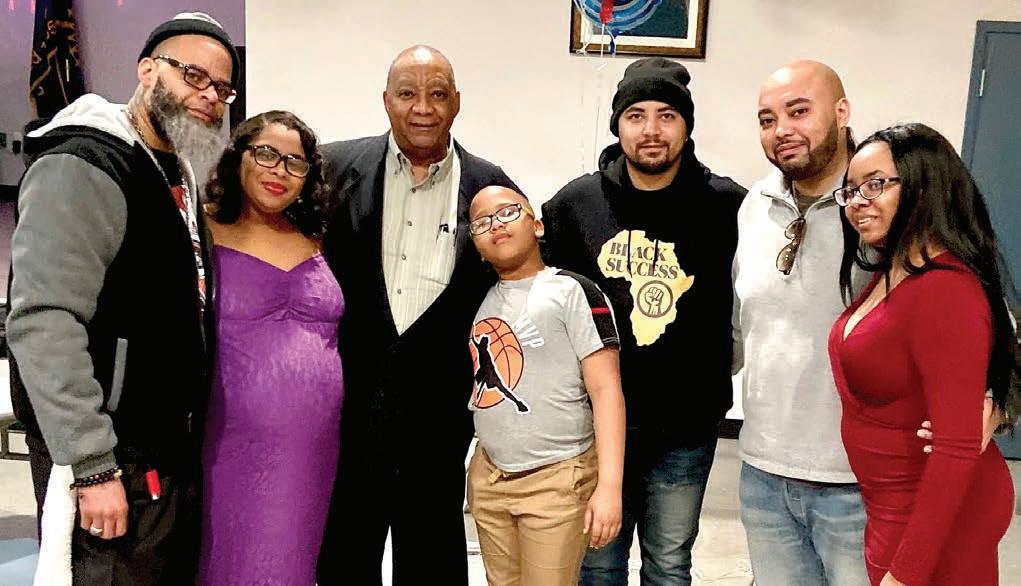
James White, Chief of Police for the Detroit Police Department, said: “We were caught somewhat flat-footed right out the gate. By design we went into the spring deployment, which is less than the mid-summer deployment, and saw we say an uptick in violence that first
Chief White attributes the violence in Greektown to a combination of weather conditions and a surge in pop-
The union is pushing for a comprehensive list of demands. This
While I can’t lower the national tariffs, I’ll keep fighting hard to lower costs and put more money back in your pocket. I’m proud of the progress we’ve made with this year’s budget and I’ll continue advocating for a commonsense trade policy. Let’s work together to help more Michiganders ‘make it’ in Michigan.
Meagan DunnJulie Schneider
Historically, shelters have provided a temporary respite for those in need, often serving as the first or second option after exhausting alternatives like staying with friends or family. Shelters offer a place to rest one’s head and a warm meal, albeit sometimes for extended periods. For others, being unhoused means living in cars or makeshift outdoor
Then, in a cruel twist of fate, Hastings Street, too, was obliterated a few years later, making way for the construction of I-375. This marked the final blow, sealing the fate of Black Bottom and signaling the beginning of the end for Paradise Valley, the Black busi-
program. Wayne Metro Community Action Agency manages the helpline, making it accessible to all Detroit residents. This initiative simplifies access to the City’s various housing services, ensuring that residents in need can easily find assistance.
and other partners, this ambitious project aims to create jobs, remove barriers to economic growth, and reconnect the neighborhood with the rest of Detroit. It is a step
In the heart of Paradise Valley, Blackowned businesses are not just flourishing but thriving, offering diverse services, products, and experiences that pay homage to the past while paving the way for a prosperous future. From jazz clubs to soul food restaurants, the Black Press, and art galleries to fashion boutiques, this revival is breathing life into the very essence of what once made this neighborhood a vibrant cultural epicenter. It’s a resurgence that extends beyond brick and mortar; it represents the resurgence of a spirit that refuses to be subdued. Detroit City Councilman Fred Durhal III, representing District 7, where Eastern Market resides, told the Michigan Chronicle, “It’s still very early in the process, MDOT
He explained, “ We saw numbers downtown that we have not seen, ever. People are emerging from COVID and there’s a feeling that we’re in a post-COVID era… and with the venues downtown and the reasons to come down with all the activities that are going on, we saw hundreds of more people and, in particularly, young folks, teenagers that we hadn’t seen.”
Responding swiftly to the surge in violence, DPD adjusted its deployment plans. Rather than waiting for mid-summer, they deployed officers in the spring itself to address the situation.
By Sam Robinson SENIOR REPORTER
By Lynzee Mychael MULTIMEDIA JOURNALIST
The causes of homelessness are as diverse and complex as the individuals experiencing it. In response, the City of Detroit has adopted a holistic approach to combat this issue.
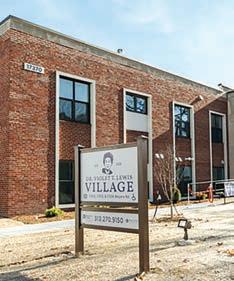
What a Federal Government Shutdown Could Mean for Detroiters?
U.S. Rep. Jasmine Crockett, D-TX, was in Detroit last weekend for a fundraiser for Michigan governor candidate Lt. Gov. Garlin Gilchrist.
“Providing services and high-quality housing to persons at risk of or who are experiencing homelessness is a key priority of the City of Detroit, said Julie Schneider, Director of Detroit’s Housing and Revitalization Department.
“This means focusing on building the pipeline of supportive housing and coordinating with the Continuum of Care on the delivery of critical resources such as emergency shelter, rapid rehousing, and diversion and prevention programs. It also means preserving and expanding affordable housing options for Detroiters of all incomes and improving housing stability though comprehensive service offerings available through the Detroit Housing Resource HelpLine and Detroit Housing Services Division within HRD.”

“The city and its partners offer a lot of great services to help Detroiters with their housing needs, but they don’t mean much if people don’t know how to access them,” said Mayor Mike Duggan. “Thanks to the efforts of our partners and the generous support of the Gilbert Family Foundation, we now have a simple process to guide residents to the right housing resource and a growing number of programs to help them.”
The two lawmakers went viral in a video posted Monday morning that’s been “liked” more than 50,000 times across Instagram and TikTok.
In May 2023, the City of Detroit launched the Detroit
in search of jobs and a better life, to the pivotal role they played in the city’s cultural and musical heritage, Black Detroiters have left an indelible mark on the city. However, in recent years, Detroit has experienced significant gentrification, which has raised concerns about the displacement of long-standing Black residents. Similar to a setting sun, there’s a rising spirit, and Black Detroiters are reclaiming their place in the city, despite the challenges posed by gentrification.
The Gilbert Family Foundation’s broader commitment involves pledging $500 million to support projects across Detroit over the next ten years, with housing initiatives being a significant part of their contribution.
The video is captioned, “POV you’re about to elect Michigan’s first Black governor.”
Notably, Detroit has witnessed a consistent decrease in recent years, with the number of unhoused residents steadi ly declining. In 2019, approximately 7,847 people were unhoused and entered the City’s community response system. In 2021, about 5,687 people experienced homelessness.
“Congresswoman Crockett and I know these times aren’t normal,” Gilchrist told Michigan Chronicle in a statement. “Everything from housing to groceries costs too much, and instead of helping people, the federal government is killing jobs, abusing power and terrorizing our communities. Rep. Crockett knows that all Democrats are not the same and not everyone is built for this moment… And as Governor, I’ll raise wages, make housing affordable, and hold the rich and

According to the City of Detroit, since the start of the fiscal year 2019 to 2021, Detroit saw a 28% decrease in the
powerful accountable.”

The rise in visitors to the Greektown area is evident in data from Placer.ai, a location analytics company specializing in visit trends and demographic insights through geolocation-enabled mobile devices. From May 1-Aug. 27, 2022, there were 1.3 million visits and 655,000 visitors to Greektown, according to Placer.ai. In the same period this year, these numbers increased to 1.4 million visits and 670,000 visitors.
Whitmer raise is a heavily scrutinized factor
because of discrimination, but they were also coming because Black people was doing some stuff. When did Black people start doing things in the city? They started doing things in this area in the 1800’s. In the 1800’s the major thing that they were doing in Detroit
As Detroit’s downtown area continues to attract both residents and visitors, the police department has implemented various enforcement measures to manage the increased population. Notably, metal detectors have been strategically placed throughout Greektown to deter the illegal carrying of firearms.
“We have strategically placed them at key points, “ Chief White explains. It has been a deterrent for some, and some have tested it. If you are legally carrying a weapon and carrying a CPL, have a great day. If you’re
Gilchrist is one of three Democrats running for governor, along with Genesee County Sheriff Chris Swanson and Secretary of State Jocelyn Benson, who leads the fundraising battle between her Democratic opponents. Crockett, a rising progressive
During the Great Migration, thousands of Black families from the South came to Detroit in search of jobs in the booming automobile industry. Despite facing discrimination and segregation, they built vibrant communities on the city’s east and west sides. Over time, these neighborhoods became centers of Black culture and entrepreneurship. According to Historian Jamon Jordon Black resilience in
Congresswoman from Texas who is reportedly weighing a U.S. Senate bid, joined Gilchrist’s fundraiser at a private residence the afternoon of Saturday, Nov. 15. A flyer for the event suggested supporters donate $500 to $5,000 to Gilchrist’s campaign.
The amount candidates vying to replace term-limited Gov. Gretchen
were coming of course
$296,000, with $385,000 left in his war chest.
“The people of Michigan, the voters of Michigan, they’re not looking for who’s connected to the most millionaires,” Gilchrist said on Off The Record in September. “If
cine and healthcare, may be adversely impacted by the decision to overturn
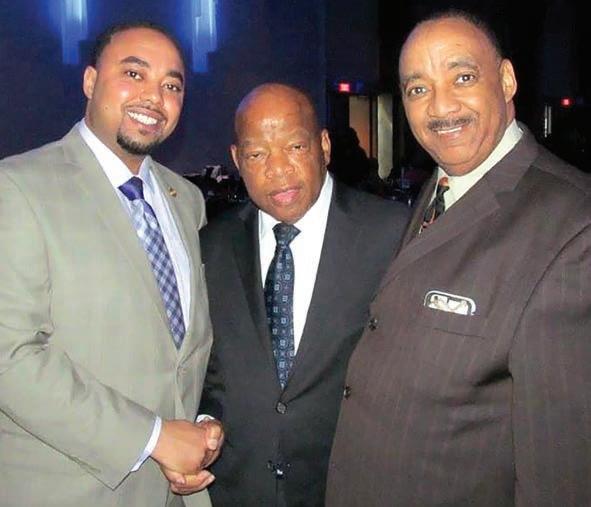
ReproducAll, a affirm abortion and freedom in constitution,” Giroux. is that everything in aborMichigan, makes we will we can patients care they
to have representalegislacollection and criminal jusrecomcollection analywith the AttorMichigan Law Standards Association Prosecutors stakeholders collect and strategically. warHouse Operations hearand other would ban of noknock urging the pass reform and Whitmer to the leg-
what the Supreme Court will rule in the upcoming
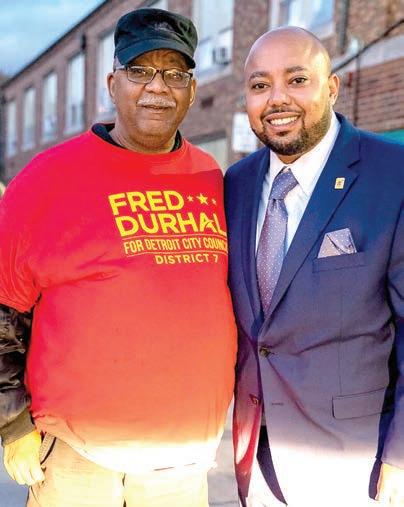
From page A-1
felt tribute to his father.
“Tonight (Nov. 19, 2025)
I lost my best friend, my mentor, my Dad,” he wrote on Facebook. “I wouldn’t be completely honest at this moment if I didn’t say that a piece of me feels empty. However, I would also be remiss if I didn’t mention how blessed I was to have such an amazing human being that touched my life.”
Fred Durhal Jr. was more than just a father to his son—he was a mentor to many, a father figure to those who lacked one, and a steadfast friend to everyone who needed support. His life’s work was rooted in the values he passed down to his family and the community he cherished. Through his work as a legislator, Durhal was known for his ability to reach across party lines and find common ground, always putting the needs of the people ahead of personal ambition.
More than legal impli cations, overturning Roe v. Wade would impact several systems across the spectrum. With the potential to drive both foster and adoption numbers upward, a ban on abortions could leave many women to choose a less safe route restoring ‘back alley’ and illegal abortion practices, including self-abortions. Moreover, African American women and women of color, who already have a long-storied history with access and inclusion in medi-
islature adopts it.
ened. Titles faded. The years of competition felt small. And I saw him not as the man I was trying to beat— but as the man he truly was. That was the last time I saw him. But the memory stayed with me.”
“What we are really concerned about is the impact on our patients. Access to abortion is al ready out of reach for far too many Michiganders, especially Black people and people of color who face additional barriers to care as a result of sys temic inequalities and in stitutional racism. Losing access to legal abortion will impact those com munities most, forcing people to become parents or expand their families against their will. Being able to decide and control if, when and how to become a parent is central to building and living a healthy, happy life,” said Vasquez Giroux.
In a 1995 article in the Michigan Chronicle, Durhal was quoted as saying, “Public service isn’t just about passing laws—it’s about making life better for the people we represent. It’s about lifting up the voices of those who have been silenced for too long.” This sentiment would define his career in the years that followed.
Increase school funding: Statutory changes to increase the School Aid Fund revenue by at least $3.6 billion and establish a permanent weighted funding formula based on student and community needs and universal preschool (0-3).
Durhal’s political career began in the 1980s when he was first elected to the Michigan House of Representatives, where he served the 5th District in Detroit. His early years in office were focused on issues that directly impacted his constituents, such as improving education, addressing housing disparities, and increasing economic opportunities for Detroit’s working-class families. Durhal became known as an advocate for the city’s most vulnerable populations, including children, seniors, and low-income residents.
Those who knew Durhal best remember a man who wasn’t just a legislator but a leader with a heart for the people.
“We stood on opposite sides of the ballot in 2010, 2012, and 2014, engaged in three unforgettable primaries. I knew—even then— that defeating an incumbent of his strength and stature would be an uphill battle. And yet I ran anyway. Not out of rivalry alone, but because facing him sharpened me, challenged me, and helped shape me.
Gov. Whitmer in support of their efforts to preserve the right to reproductive freedom,” said Chair Alisha Bell, on behalf of the Wayne County Commission.
legacy may well be his devotion to his family. Durhal III, who has followed in his father’s footsteps by becoming a politician, continued with his deeply personal message following his father’s passing.
Beyond the scope of pro-choice versus prolife, the fight for reproductive choice is one of freedom. As Michigan officials work to ensure each woman who finds herself in the position to choose has access to care without the threat of legal action, many wonder
“He was the greatest man I have ever known,” Durhal III wrote. “He was the greatest father in the world, and he poured so much of himself into me, even at times when he didn’t have much to give.”
The health committee recommends reviewing state licensure policies to address the barriers that Black psychologists face in obtaining licensure in Michigan.
Durhal’s leadership went far beyond his legislative duties. He served on numerous community boards and organizations, always committed to improving the quality of life for Michiganders. He was also a key figure in Detroit’s efforts to revitalize neighborhoods and bring attention to the city’s economic challenges, particularly the disparity between the city’s wealthier and more impoverished communities. His work with local organizations helped to ensure that at-risk youth had access to educational resources, while also advocating for affordable housing for families struggling to make ends meet.
Reject censorship in history instruction: Encouraging Gov. Whitmer to ensure the goal for Michigan schools should be history instruction that is presented by professionals with the subject matter expertise, pedagogical skills, and judgment necessary to present complex information to students that are grounded in provable facts and add to the understanding of modern-day America.
Durhal’s death marks the end of an era for Michigan politics. As a father, legislator, and public servant, Fred Durhal Jr. touched the lives of countless individuals, both personally and professionally. He believed in the power of community, in the strength of the people, and in the possibility of a brighter future for all. As Fred Durhal III so poignantly wrote in his tribute: “Although he will not be here with me physically, I know for a fact he lives on through me and so many others.”
Ensure equitable distribution of state health funds: Ensure all Michigan communities with a significant Black population receive adequate funds to address mental health issues.
Protecting Black voting rights: Urge state officials to remain vigilant in the fight against schemes to disenfranchise Michiganders of color.
Mayor-elect Mary Sheffield, who currently serves alongside Durhal III on Detroit’s city council, released a statement, sending condolences to the Durhal family.
Increase mental health supports for the Black community: Recommending Michigan set a goal of increasing the number of Black mental health service providers by 20% each year over five years.
“What I did not realize then was that these political battles were preparing me for the victory I would eventually earn in 2018. But by that time, Fred was no longer running. Illness had stepped in where politics once stood. Not long after, I visited him in the hospital. I expected a brief, polite exchange. Instead, what we shared were unexpected moments of honesty, warmth, and connection. In those quiet hospital hours, the walls between us soft-
“Chancellor Ivery is a true transformational leader and an outstanding CEO, who is more than worthy of the CEO of the Year Award he just received, “ said Prof. James C. Mays, who teaches entrepreneurship and supply chain management at WCCCD’s Corporate College. “In his 27 years at WCCCD, Dr. Ivery has elevated WCCCD to become nationally recog women been premoment of the final. a law1931 law effect, asked the affirm that constitucontain abortion. Our Planned Advocates of founding coalition
“Throughout his decades of public service, from his tenure in the State House to his leadership as Chair of the Michigan Legislative Black Caucus, Rep. Durhal exemplified dedication, integrity, and courage in advancing the well-being of our city and its residents. [His] unwavering commitment to public service transformed countless lives. He fought for equity, opportunity, and justice, and his leadership inspired both colleagues and constituents alike. His vision and dedication strengthened our communities and helped pave the way for future generations of leaders,” Sheffield said.
“BLAC members have worked hard to identify the needs of the Black community and we feel these recommendations will provide a solid first step towards breaking down barriers in education, community safety, health and business,” said BLAC Co-Chair Dr. Donna L. Bell.
Durhal’s passing is a reminder of how rare it is to find a public servant who is as deeply committed to both his work and his family. He was a fighter, rarely complaining, and took each day as an opportunity to do more. Even in his final days, he fought with the same courage and tenacity that defined his life. “Dad, you were a fighter until the very end. You not only fought the good fight, you won so many times,” his son wrote. “They don’t make them like you.”
BLAC will hold a virtual town hall meeting to discuss its policy recommendations on Thursday, May 12 at 4 p.m. Join BLAC and a virtual audience in discussing the recommendations to support the Black community.
“I extend my deepest condolences to my colleague, Councilmember Fred Durhal III, his family, and all whose lives were touched by Fred Jr.’s work. His contributions have left an indelible mark on the city of Detroit, and his enduring legacy will continue to inspire generations of Detroiters.”
Durhal’s impact on the political landscape was significant, but his greatest
BLAC is housed in the Michigan Department of Labor and Economic Opportunity. Members represent many professional backgrounds, including economics, law, public safety, health and wellness, arts and culture and media. They leverage their experiences and expertise to make recommendations to the governor on critical issues affecting embraces. transforleadership as a approach that change the syscircumstancoperating Ivory “Transformationdoesn’t just do certhem view of and exdrive that because what create everyentire because people believe that they need to for themselves and others to live better lives.”
Fred Durhal Jr. leaves behind a legacy of service, compassion, and leadership that will endure for generations. He is survived by his children, his extended family, and countless friends and colleagues whose lives were made better by his example. Detroit Mayor Mike Duggan, who ran against Durhal Jr. in Detroit’s 2013 mayoral race, shared: “Detroit lost one of its most tireless champions and dedicated public servants.... Fred Durhal, Jr., the father of City Councilmember Fred Durhal III, represented Detroit with a blend of fire and human compassion in the State House that earned him the respect of his peers and the admiration of his constituents. During the city’s bankruptcy, no one fought harder than Rep. Durhal for Detroit’s retirees.”
As the people of Michigan mourn the loss of a great man, they are also reminded of the power of compassion, dedication, and the deep love for one’s community. Fred Durhal Jr. leaves behind a model of service that will inspire future

generations of leaders. His work is far from done; it lives on in the values he instilled in his children, his colleagues, and the people of Michigan.




this was a contest about who got the most
millionaires in their phone — that’s not me. I’m connected to working people.”
Gilchrist said he came to Lansing as an outsider and has been pitching his campaign to progressive voters upset with the current Democratic leadership. In a video posted to social media last month, Gilchrist said the Democratic party already has enough lawyers, “we need builders with new ideas,” he said.
“You have too many Democrats that just are beholden straight up to corporate interests, to millionaire and billionaire donors,” Gilchrist said in the video. “You have too many Democrats who are scared to have a fight about anything important. That’s why people have been not just frustrated but have been making other choices.”
The comments drew the rebuke of Attorney General Dana Nessel, who on Twitter criticized Gilchrist for his post: “For the Lieutenant Governor, and a candidate for the highest elected office in the state, to fail to appreciate the important role lawyers play in today’s current landscape and our


nation’s history is deeply concerning and offensive to those of us who have fought tirelessly to protect the rights of so many in our state.”
Gilchrist’s invitation to Crockett as a special guest of the weekend fundraiser is another signal indicating the progressive nature of his politics and the direction of his campaign. He’s going all in on courting progressives upset with the Democratic establishment.
Gilchrist was recently endorsed by U.S. Rep. Rashida Tlaib, D-Detroit, after the Democrat became the first running for governor to declare the war in Gaza an active genocide during a speech at an Arab American festival in Dearborn.
In the same comments, he vowed against taking money from corporate PACs, the only Democratic candidate for governor to do so.
Sitting in waiting for the respective winners of the Democratic and Republican primaries is independent Detroit Mayor Mike Duggan. He reported raising $1.17 million in the last quarter, with $2.46 million on hand. You can reach Sam at srobinson@ michronicle.com.



As temperatures begin to drop, DTE Energy is stepping up to help Michigan families stay safe and warm this winter. Through its Low-Income Self-Sufficiency Plan (LSP), eligible customers can access affordable, fixed monthly payments and up to $3,000 in past-due balance forgiveness. To qualify, applicants must be DTE customers and meet income guidelines.
“Michigan winters can be challenging, and no one should have to make the difficult choice between staying warm and meeting other essential needs,” said Evette Hollins, vice president of Customer and Community Engagement, DTE Energy.
“We understand the stress financial hardship can bring, especially during the coldest months. That’s why our Low-Income Self-Sufficiency Plan is more than just a program – it’s a lifeline. By offering predictable monthly bills and forgiveness of past-due balances, we can help families feel secure, supported and cared for when they need it most.”
The 24-month program allows customers to pay a fixed monthly amount based on income and energy usage while benefiting from forgiveness of past-due balances. DTE’s LSP coincides with the recently expanded Michigan Energy Assistance Program (MEAP) funding, now allowing households earning up to 60% of the state median income, approximately
When DeShawn W. retired from a 21year career in the U.S. Navy, he knew he wanted to keep serving his community. In 2019, the Detroit native launched his small business, Duke Investments & Associates, which helps connect the community to vital services in construction, medical and information technology. Through his work, he uncovered a critical need in Detroit: thousands of older homes across the city aren’t energy efficient, and there aren’t enough certified contractors to connect families to the upgrades that could save them money on their energy bills.
He found his new opportunity to make an impact through the DTE Energy Efficiency Academy. The Academy, launched in 2023 in partnership with Walker-Miller Energy Services, provides paid, hands-on training to help participants earn nationally recognized certifications in building science, insulation, HVAC and electrical work.
“There are so many Detroit homes that need upgrades to their HVAC systems, windows or insulation,” DeShawn explained. “The more contractors certified to do energy efficiency assessments in these houses, the better we can help families save money. This program is changing neighborhoods.”

$70,000 annually for a family of four, to enroll in the program and receive critical support.
Key benefits of the LSP include:
• Shutoff protection throughout enrollment
• Affordable, fixed monthly payments tailored to household income and energy needs
• No late fee charges during active participation
• Up to $3,000 in forgiveness toward past due balances: $600 upon enrollment, another $600 after Year 1, and up to $1,800 upon program completion
• Energy usage reviews every six months to adjust payments and credits issued if usage is lower than estimated Customers can call 2-1-1 to get connected with energy assistance agencies that will guide them through the application process.
DTE also offers additional energy assistance programs including Senior Winter Protection, Active Military Protection, Medical Emergency Protection and more. For more information, visit dteenergy.com/help.

Through the Energy Efficiency Academy, DeShawn earned multiple Building Performance Institute (BPI) certifications, including Building Analyst Technician and Healthy Housing Principles. These credentials opened the door to conducting energy and weatherization assessments across Metro Detroit. For homeowners, those
assessments can unlock rebates to upgrade HVAC systems, insulation and electrical work, at no cost for eligible households.
“Getting these certifications was something I never imagined and it’s been heaven-sent,” said DeShawn. “The program gave me confidence and the tools to grow my business while helping families make their homes more energy efficient. When households can save on monthly heating and cooling costs, they have more money for groceries, childcare or saving for the future, and making this type of difference for families keeps me motivated in my work.”
DeShawn was part of a class of 20 participants and today, he continues to work with other graduates, contractors and DTE to bring energy-efficient solutions to Detroit families.
His story is one of many showing how the Energy Efficiency Academy is turning skills into careers, and careers into community impact.
If you or someone you know is ready to take the next step toward a fulfilling career in clean energy, visit empoweringmichigan.com/EEAcademy to learn more.

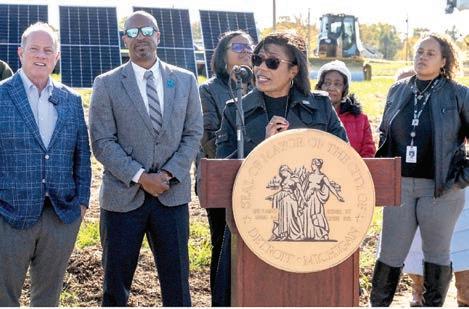
supporting the City of Detroit in its clean energy goals, which include powering 100% of the City’s municipal buildings with clean energy by 2034 and sourcing 50% of Detroit’s electricity from clean energy in the next three years.
“The way Detroit is doing solar is very different than you
By Ebony JJ Curry SENIOR REPORTER
Momentum continues to build around Black entrepreneurship in Michigan, and the Michigan Black Business Alliance is adding new leadership to meet that moment. The Alliance has appointed Vincent Pierson as its Chief Operating Officer, an intentional move meant to deepen the organization’s reach and strengthen the economic infrastructure Black business owners rely on across the state.
MBBA now represents more than 2,300 members, a network of entrepreneurs who turn to the Alliance for access to capital, statewide visibility, and policy advocacy. The organization has helped connect its members to over $13 million in funding through its programs, shaping a support system that fills gaps left by traditional financial and business development institutions. The investment in a new COO reflects a commitment to expanding that work at a time when many Black businesses are still navigating long-standing structural barriers.
Pierson enters the role with more than 15 years of leadership experience across sports, social impact, and organizational strategy. His background includes directing DEI efforts at Minor League Baseball, where he launched the league’s first national diversity, equity, and inclusion platform. He also leads the Black Sports Business Academy, a national initiative that links HBCU students to career pathways across the sports and entertainment fields. His work has consistently centered on widening access and reshaping leadership opportunities for communities that have historically been left out.
MBBA President and CEO Charity Dean said Pierson’s leadership brings a needed
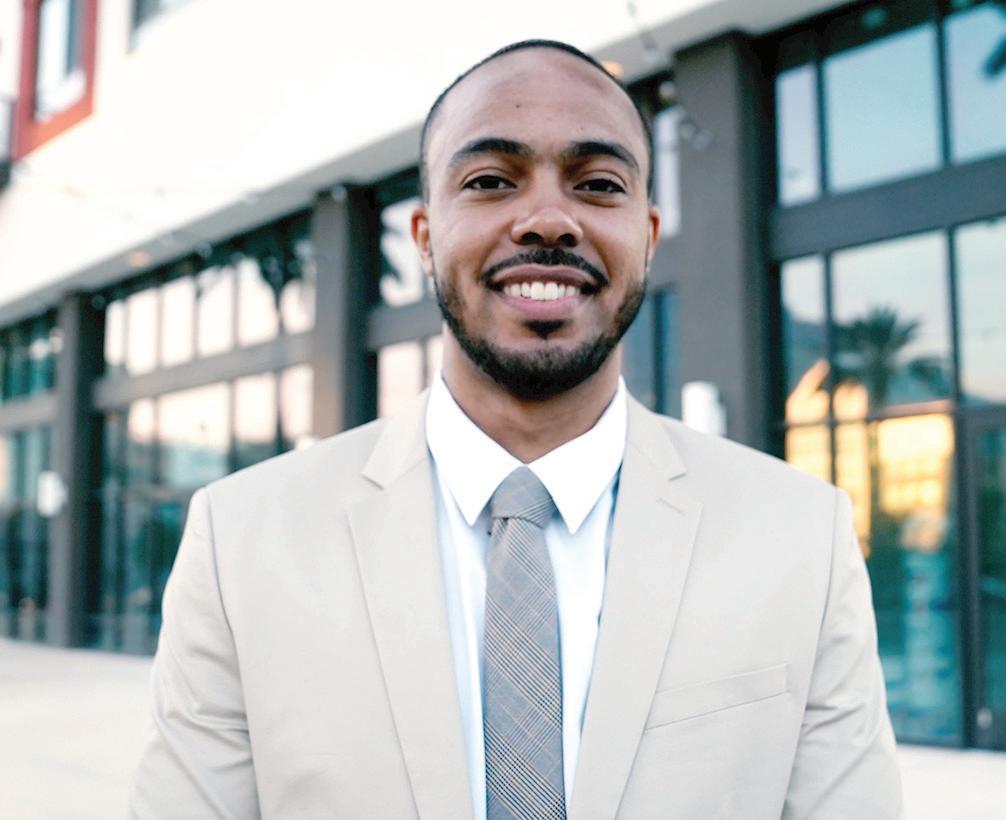
combination of credibility, experience, and community-driven purpose.
“Vincent brings a proven record of transformative leadership, innovation, and community impact,” Dean said. “His ability to connect purpose with performance aligns perfectly with MBBA’s vision of connecting and transforming the ecosystem, disrupting the status quo and building strong Black businesses across Michigan.”
As COO, Pierson will lead statewide operations, deepen member engagement, and guide the rollout of MBBA strategies designed to expand access to resources across Michigan’s urban, suburban, and rural communities. His role comes at a time
By Jeremy Allen EXECUTIVE EDITOR
The recent rollout of the Rx Kids initiative in Wayne County has drawn attention for its efforts to address health and economic challenges facing new mothers. But while the program is reshaping maternal and infant health outcomes in cities throughout the country, Detroit is not among them. Here’s why.
Rx Kids, a pioneering program in partnership with Michigan State University, aims to offer eligible expectant mothers $1,500 during pregnancy and $500 monthly for their newborn baby’s first six months. Originally launched in Flint in 2024, Rx Kids has reached more than 3,900 families with $17 million in direct cash support. This latest expansion (announced earlier this month) is reaching six select communities—River Rouge, Hamtramck, Highland Park, Inkster, Melvindale, and Dearborn—thanks to a $7.5 million investment from Wayne County and an additional $250 million in state funding.
These cities were selected based on two critical factors: public health jurisdiction and demonstrated need.
Wayne County’s Health Department, Human Services, and Veterans Services serve communities without their own municipal health departments. Detroit, although geographically located within Wayne County, maintains its own independent health
By Ebony JJ Curry SENIOR REPORTER
department, which manages programs for its residents. Because of that distinction, Detroit was not eligible under the county-administered Rx Kids launch.

With nearly one-in-three children living below the poverty line, Wayne County has one of the highest child poverty rates in Michigan. The six selected municipalities for Rx Kids are among those with the highest child poverty rates in the county, where families face compounding challenges related to health, housing, and access to care.
Wayne County Executive Warren C. Evans emphasized the urgency of the intervention and the county’s commitment to meeting families where they are.
“As the top elected official in Wayne County, there was no way I could just sit here and not do anything about the health care crisis that too many of our residents are facing,” Evans said. “Rx Kids can’t solve the entire problem, but it will certainly relieve a significant amount of the burden for quite a few.”
Rx Kids, when launched, became the nation’s first community-wide, nostrings-attached cash support program
Detroit’s small business ecosystem was on full display at One Campus Martius during the closing ceremony of Detroit Elevate, the new growth-stage business program led by TechTown Detroit and the Gilbert Family Foundation. Forty-four Metro Detroit entrepreneurs completed the inaugural cohort, which ran from August through November and focused on scaling businesses that are already generating revenue but lack access to tailored growth support.
The program operated with assistance from Black Leaders Detroit and QT Business Solutions. Over four months, participating founders received one-on-one coaching, strategic planning support, technical assistance, and new customer visibility. According to program data, Detroit Elevate delivered $326,000 worth of technical assistance, plus $15,000 in committed tax preparation support, alongside more than 460 hours of virtual coaching and strategy calls.
The closing ceremony was structured as both a showcase and an investment announcement. Entrepreneurs presented their products and services to judges, supporters, and the press. Attendees moved booth to booth, learning how each business is contributing to Detroit’s economic landscape. The evening ended with the announcement of grant recipients selected for business growth, presentation, and community impact.
Grant Winners:
$50,000 – Spectacle Society
$30,000
$20,000
$10,000
Three additional businesses received People’s Choice recognition based on event voting: Best Booth: For the Love of Cheesecake Best Pitch: MG Studio Most Likely to Be My New Favorite: The Pose Experience
For many founders, these awards represent critical nonloan capital — the kind rarely accessible to small businesses owned by Black and Brown Detroiters. Many of the companies represented in the cohort operate storefronts, employ local residents, or serve neighborhood-based customers who often fall outside traditional investment pipelines.
“Detroit Elevate’s first cohort demonstrated what’s possible when growth-stage businesses receive the right tools,
when Black entrepreneurs continue raising concerns about capital access, procurement inequities, and limited entry points into major economic development initiatives. MBBA has become one of the state’s strongest voices in pushing those issues forward.
Pierson said he steps into the role with a clear understanding of the responsibility it carries.
“I’m excited to join the Michigan Black Business Alliance and continue the transformational work of connecting our members to real opportunities while removing barriers to access and success for Black entrepreneurs across Michigan,” he said.
for new and expectant mothers. With this Wayne County expansion, the program will be available to mothers in 17 Michigan municipalities. Participating areas have reported near-universal enrollment and significant improvements in maternal and infant health outcomes.
Evans further explained the strategic approach behind the initiative: “This is about taking the most direct, efficient and impactful approach to serving those most in need in as timely a manner as we were able to do so,” he said.
Yet perhaps most tellingly, Evans spoke to the human impact: “I might add that contributing to the health of a child that otherwise might have faced daunting challenges is about the best holiday gift I can imagine. Not only for the mother and child, but for those of us who were able to help them”.
Eligible expectant mothers in the six participating Wayne County communities can now apply to receive $1,500 during pregnancy and $500 per month for the first six months of their child’s life. The program delivers direct support during the most critical stage of a child’s development, helping families stabilize and thrive.
Detroit residents seeking maternal and infant health support can access the comprehensive services and resources available through the city’s independent Department of Health, which operates programs tailored specifically to Detroit families’ needs.

technical assistance, and community support,” said Christianne Malone, Assistant Vice President for Economic Development at Wayne State University and Chief Program Officer at TechTown. She noted that enthusiasm from cohort members on social media signals how much unmet demand exists for this kind of support.
Detroit Elevate was designed as a pilot. Its structure centered on practical growth tools—business systems, market strategy, financial readiness—not pitch competitions or theoretical curriculum. Rather than asking entrepreneurs to start from scratch, the program focused on accelerating what they have already built.
The ceremony doubled as a networking platform. Business owners exchanged contacts with interested retailers, buyers, and investors. Several founders used the showcase to secure new customers in real time.
For Detroit’s small business landscape, the outcome of the first cohort offers a clear takeaway: technical assistance and early-stage funding remain determining factors in who scales and who stalls. If Detroit Elevate continues, the program will likely become an entry point for the businesses most often overlooked— the ones rooted in neighborhoods, hiring Detroiters, and circulating revenue inside the city’s economy.
No speeches claimed this event would solve the capital gap, but the awards made one thing clear. When resources move directly to Detroit founders, measurable growth follows. Ebony can be reached at ecurry@michronicle.com.
His message focused on collective strength, adding, “Throughout my career, I’ve focused on leveraging the power of community to advance access, equity, and opportunity. I’m grateful for the chance to help build a more prosperous future and deliver tangible results for Black businesses across our state.”
His appointment comes as MBBA expands key initiatives that support business growth, including programs that strengthen access to capital, increase visibility in statewide markets, and reinforce policy advocacy around more inclusive economic systems. Entrepreneurs are continuing to navigate disparities in lending, limited access to government contracts, and uneven recovery from the pandemic’s economic fallout. MBBA has responded by building programs rooted in community voice and real-time needs.
Pierson’s background in pipeline development, national partnership building, and organizational strategy positions him to guide the Alliance through a period of growth. His experience creating frameworks that connect mission to impact aligns with the organization’s push to build long-term economic stability for Black business owners.
The appointment signals that MBBA is preparing for an expanded statewide footprint — one that centers Black economic mobility, demands accountability from public and private institutions, and continues to build the conditions that allow Blackowned businesses to thrive.
With Pierson stepping into this leadership role, the Alliance is reinforcing its message that Michigan’s economic future must include intentional support for Black entrepreneurs at every stage of business development.
Ebony can be reached at ecurry@michronicle.com.
STATE OF MICHIGAN BEFORE THE MICHIGAN PUBLIC SERVICE COMMISSION **** NOTICE OF HEARING FOR THE GAS CUSTOMERS OF DTE GAS COMPANY CASE NO.
•
•
A5 | Nov. 26 - Dec. 2, 2025
By Anthony O. Kellum
CONTRIBUTING WRITER
For Black families across America, the journey toward homeownership has never been just about buying a house it has always been about reclaiming dignity, building stability, and securing access to opportunities deliberately denied to our community for generations. From redlining to discriminatory lending, from suppressed wages to limited financial tools, the barriers have been real, intentional, and deeply felt.
Today, through the Property is Power initiative, we’re proud to present two transformational pathways designed to meet our people where we are and move us forward strategically, accessibly, and powerfully. These programs operate separately, yet together they serve one mission expanding Black homeownership and building generational wealth.

One removes the financial wall that has blocked so many families at the starting line. The other creates a structured, accessible path for families who need time and support to qualify. Together, they represent a major leap toward closing the homeownership gap and opening doors.
Program 1: Down Payment Assistance (No Money Down)
Removing the Barrier That Has Held Our Community Back the Longest
This groundbreaking Down Payment Assistance program tackles the single largest hurdle to Black homeownership: upfront cash. Too many hardworking families can comfortably afford a monthly mortgage but simply cannot come up with thousands of dollars upfront in a system that was never designed for our success. Through our pilot partnership, Property is Power is proud to offer a program with unprecedented access: no borrower down payment required; no income limits or restrictions; credit scores down to 580 accepted; manual underwriting allowed; non-occupant co-borrowers permitted; gift funds eligible. This program opens the door for families who have the desire, the stability, and the readiness to own but who need the system to be fair, flexible, and designed with their realities in mind. This is real access. Real opportunity. Real ownership.
Program 2: Lease-to-Own Pathway Rent Today. Own Tomorrow.
Our Lease-to-Own program exists for individuals and families who are ready for the lifestyle of homeownership but may not currently fit the traditional mortgage “box.” Instead of keeping families stuck in the rental cycle, this pathway builds a bridge to ownership structured, supportive, and built with intention. Here’s how it works a qualified FHA-eligible government entity purchases the home upfront; you move in as the future homeowner not a typical renter; you lease the home for 12 months while building credit, stability, and financial profile; after 12 months of rental history, you assume the mortgage; eligibility includes primary residence, up to 96.5% LTV, and both full doc or alternative income options. And for those who do not currently meet FHA standards, the Property is Power Dream Builder offers a tailored environment to get you mortgage-ready with structure, dignity, and a clear end goal. This program is rooted in the understanding that readiness is not always reflected on paper. Sometimes people don’t need a “no” they need a plan.
A New Legacy Begins Here
Every time a Black family becomes a homeowner, something far deeper than a housing status changes. A new identity forms. A new level of stability emerges. A new set of opportunities appears, ones that research shows can reshape a family’s trajectory for generations. Homeownership is more than shelter. It is economic mobility. It is generational wealth. It is dignity and power. When a family transitions from renting build-
See HOMEOWNERSHIP FOR BLACK FAMILIES Page A-6

By Ebony JJ Curry SENIOR REPORTER
The former home of Michigan’s only Historically Black College and University has entered a new era with the opening of the Dr. Violet T. Lewis Village, a $29.3 million affordable senior housing development bringing more than 100 income-restricted apartments to Detroit’s northwest side. The project sits on the original campus of the Lewis College of Business, the institution founded by Dr. Violet T. Lewis that served generations of Black students seeking business and clerical training when many educational paths were closed to them.
The site’s history runs deep in Detroit.
The Lewis College of Business operated at 17370 Meyers Road, where the new housing now stands. Years after the college’s closure, its legacy was carried forward through the reactivation of its charter. The reimagined campus, now known as the PENSOLE Lewis College of Business and Design (PLC Detroit), operates at 200 Walker Street in Detroit’s Rivertown/Innovation District.
The original Meyers Road campus — long vacant — is the land now redeveloped into the Dr. Violet T. Lewis Village.
City and state officials joined development partners and the Lewis family for the ribbon-cutting. Mayor Mike Duggan, City Council Member Angela Whitfield Calloway, State Representative Regina Weiss, Dr. Violet Ponders (granddaughter of Dr. Lewis), Wallick CEO Amy Albery, and Presbyterian Villages of Michigan (PVM) leaders Roger Myers and Reverend Dr. Louis J. Prues marked the opening alongside community members.
“This site has such a deep history in our city, being the location of Michigan’s only HBCU for many years,” said Mayor Mike Duggan. “I’m so glad that Presbyterian Villages has preserved Violet Lewis’ legacy as part of this beautiful new community that is providing more than 100 affordable apartments for our seniors.”
The development pairs preservation with new construc-
tion. Two historic campus buildings were restored, and a new four-story building was added. Construction began in spring 2024 through a partnership between Wallick Communities of New Albany, Ohio, and Southfield-based PVM. The completed project includes 105 apartments, all income-restricted and designated for seniors.
“With the completion of Dr. Violet T. Lewis Village, there will be 105 new and affordable homes for seniors in Detroit,” said Wallick CEO Amy Albery. “Wallick is committed to providing people of all incomes safe and stable housing as they age.”
PVM President and CEO Roger Myers emphasized the continued role of the organization in senior housing across the city.
“The Dr. Violet T. Lewis Village represents an important and historic expansion of our services to seniors in Detroit that began almost 30 years ago, with the opening of The Village of Bethany Manor in the Virginia Park neighborhood. We are pleased to be partnering with Wallick Communities in their first development in the City of Detroit, with more to come.”
Affordability is central to the project. All units are regulated for residents earning 30% to 80% of area median income (AMI), or $20,160 to $69,120 annually. Rents vary by building type.
In the new construction building:
• One-bedroom units: $783–$840
• Two-bedroom units: $983 All capped at 60% AMI, or $40,320 per year.
In the rehabilitated historic buildings:
• One-bedroom units: $427–$786
• Two-bedroom units: $723–$939
These units accommodate the full 30%–80% AMI range. Five apartments are project-based voucher units reserved $29.3M Housing
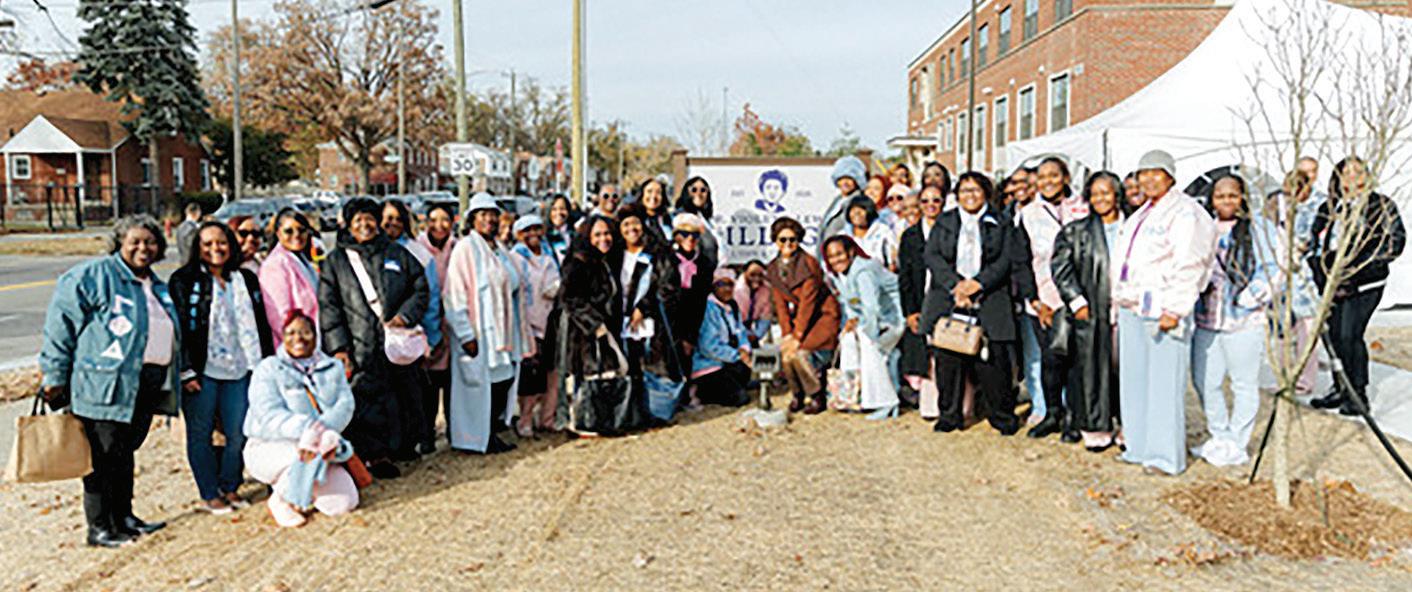
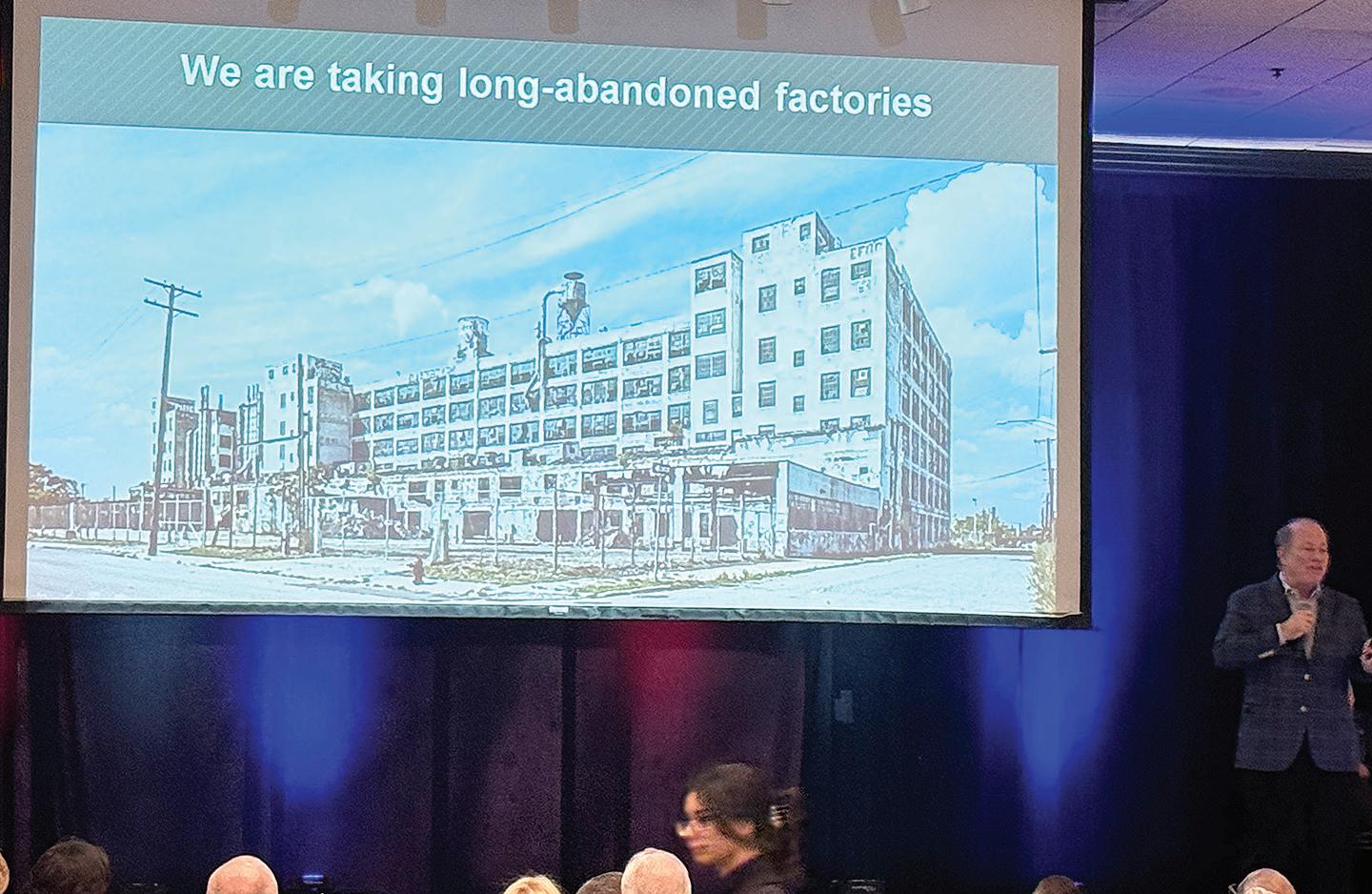
By Sam Robinson SENIOR REPORTER
After Australian mining company Fortescue pulled the plug on an under-construction $210 million factory that promised to bring 600 good-paying jobs to the area, Democratic lawmakers are calling for accountability.
Progressive leaders called for answers this week for the cancellation of the EV battery plant that would have transformed the former Fisher Body plant in the Milwaukee Junction neighborhood into a clean-energy manufacturing hub.
“Current policy settings and market conditions in the United States, including recent changes to critical tax credits, have created significant uncertainty around the viability of long-term investment in advanced manufacturing,” a Fortescue spokesperson said in a statement to Crain’s Detroit Business, which first reported the news.
The company announced the proposed EV plant at the Fisher Body Plant in 2023. EV chargers, batteries, and hydrogen generators were planned to have been built there.
Officials, including State Sen. Stephanie Chang, said the September cancellation is a huge hit to the potential progress on local employment, industrial revitalization, and air-quality improvements.
“To cancel a critical clean energy investment in Detroit is to rip away more breathable air for our children, our grand-
From page A-5
children and vulnerable Michiganders,” Chang said. “The Trump administration’s rollbacks on clean energy policy is indicative of the fact that they fail to understand the positive jobs, climate and health impacts for our local communities. We should not stifle innovation or clean energy progress to keep outdated energy sources alive.”
The company cited the cutting of clean energy tax credits in the Republicans’ most recent budget bill, according to a report from Politico last week.
On Wednesday, November 19, local leaders came together to demand accountability for the cancellation of the Fortescue electric vehicle battery plant – and the loss of the 600 good-paying jobs and cleaner future for Detroit families that would have come with it. Chang spoke about Detroit’s future as a clean energy leader and how EV manufacturing has been stymied by the cancellation of clean energy incentives through the Republican-led budget bill.
The cancellation is a setback for the city’s attempt to bring a green manufacturing boom. The facility, which was to be the company’s first U.S. Advanced Manufacturing Center, was expected to create 600 jobs with an average annual wage of more than $45,000.
The project was aggressively courted by state leaders who offered $12.7 million in tax incentives and $11 million in Detroit brownfield incentives.
“Detroit has always been at the forefront of vehicle innovation, and this investment was an opportunity to show what Motor City is able to do,” said Jamie Racklyeft, Executive Director, Michigan Electric Vehicle Alliance (MEVA). “We can still be the hub for electric vehicle innovation if our leaders prioritize clean energy so we can make a brighter future for transportation.”
You can reach Sam at srobinson@ michronicle.com.

From page A-5
for seniors with the lowest incomes.
Apartments include Energy Star appliances, ceiling fans, luxury vinyl flooring, window treatments, and private balconies or patios. The property offers on-site management, a fitness area, community space, and computer access.
Financing relied heavily on federal Low-Income Housing Tax Credits allocated by the Michigan State Housing Development Authority (MSHDA). Additional support came from MSHDA gap financing, City of Detroit HOME and American Rescue Plan Act funds, The Kresge Foundation, Merchants Capital Security Bank, First Merchants Bank, and the Federal Home Loan Bank of Indianapolis. The LIHTC program has supported the preservation or construction of more than 119,000 affordable homes across Michigan.
The redevelopment brings new life to a property that shaped Detroit’s Black educational and economic landscape for decades. The Meyers Road campus once trained students who faced systemic exclusion in business schools and workplaces. Its transformation into senior housing returns the land to active community use while acknowledging the work of Dr. Violet T. Lewis, whose impact still anchors Detroit’s history.
Applications for Dr. Violet T. Lewis Village can be submitted at 313-270-9150 or through the Presbyterian Villages of Michigan website.
Ebony can be reached at ecurry@michronicle.com.
From page A-5
ing someone else’s wealth to owning and building their own, legacy begins immediately.
With Down Payment Assistance, families can finally cross the financial threshold that has been blocking them for decades. They can purchase without draining savings, without taking predatory loans, and without feeling like the system is working against them. Ownership means equity, appreciation, tax benefits, and the power to control your financial future.
With the Lease-to-Own pathway, fami-
lies gain time and structure without sacrificing dignity or stability. They live in the community they want to be part of, build their financial strength, and get closer to ownership every month. And when they close, they do so with confidence and equity already working for them.
This is how generational wealth is built: step-by-step, structurally, intentionally rooted in the realities of our community and the vision we have for our children. A new legacy begins here not because the system suddenly became fair, but because we created solutions that put power back in our hands. We are rewriting the terms
of access. We are broadening the pathways. Property is Power is not just describing programs. We are opening doors. We are reshaping futures. We are strengthening families now, and for generations to come. With these two pathways one that removes the upfront burden and one that provides time and structure homeownership becomes possible, practical, and transformative. Because when our people own property, our people own power. And that is where legacy truly begins.
Property is Power! is a movement to promote home and community ownership. Studies indicate homeownership leads to higher graduation rates, family wealth, and community involvement.

By Jeremy Allen EXECUTIVE EDITOR
The Michigan Department of Education announced that 68 schools across the state have exited its support system after demonstrating significant academic improvement and meeting criteria for improved academic performance. This achievement, the MDE says, is a reflection of the hard work put in by educators, parents, and local communities, who collaborated with the MDE to uplift student outcomes.
The latest data, released by the Michigan Department of Education as part of the 2024-25 Michigan School Index accountability results, shows that these schools have made enough progress in their student performance to no longer require additional state intervention.
The announcement represents an important milestone in Michigan’s broader efforts to address challenges in K-12 education, particularly in districts with historically low-performing schools. For many schools, the exit from the state’s support system means they have met the criteria for improvement in areas such as math and English language arts proficiency, as well as in graduation rates and student attendance.
“The Michigan Department of Education is committed to working with districts to improve student achievement and graduation rates,” said Dr. Sue C. Carnell, Interim State Superintendent. “I am very pleased to see that 68 schools—including 33 out of 98 schools that were in partnership agreements with MDE—no longer require additional supports from the department because of the hard work by local district and intermediate school district staff, children, parents, community members, and MDE employees. When we work together, we can provide the services our children need to learn and reach their full potential.”
Among the 68 schools exiting the state’s support system are several from Detroit, a city where schools have long faced significant challenges in terms of funding, academic achievement, and student outcomes.

Detroit Public Schools Community District has a total of 24 DPSCD schools exiting the Comprehensive Support and Improvement (CSI) category, a sign of positive momentum for the district.
This is noteworthy, especially considering that DPSCD has historically been one of the most heavily scrutinized districts in Michigan due to its low performance in state rankings. The fact that so many of its schools have now met the exit criteria speaks volumes about the district’s ongoing efforts to improve educational outcomes. Many of these schools have worked closely with MDE over the past few years to develop targeted strategies for improving student performance, and their results are starting to show.
However, the number of Detroit schools that were on the original list of schools requiring state intervention speaks to the broader challenges faced by urban districts. The district has been grappling with the effects of funding inequities, high poverty rates, and a significant achievement gap between students of different racial and socioeconomic backgrounds.
As a result, many Detroit schools were initially placed in the MDE’s Comprehensive Support and Improvement category, which targets the lowest-performing schools in the
state. Detroit’s high rate of schools in this category reflects these systemic challenges.
But the 24 DPSCD schools that have exited the state’s support system now stand as examples of what is possible when there is a concerted effort to make improvements, both at the local district level and with the assistance of state resources. The work is not finished, of course. There are still DPSCD schools that remain in need of state support, but the success of these 24 schools is seen as a promising development in the long-term effort to improve education in Detroit.
The Michigan Chronicle’s recent Pancakes & Politics Overdrive event, which focused on K-12 education, featured a powerful conversation about the ongoing struggles of schools in urban districts like Detroit. Key leaders in education discussed how challenges such as funding disparities and the need for greater support for teachers play a significant role in shaping the trajectory of Michigan’s public schools. The conversation highlighted how state and local agencies must continue to collaborate to ensure that improvements are sustainable and that schools in struggling districts continue to make progress.
As Dr. Carnell emphasized, collaboration is key.
“When we work together, we can provide the services our children need to learn and reach their full potential.”
The exit of these 68 schools, including so many from DPSCD, underscores the positive impact that such collaboration can have.
While Detroit’s schools have long faced systemic challenges, this data suggests that with the right support and resources, significant change is possible.
The exit of schools from the Comprehensive Support and Improvement category is an indication that Michigan’s education system is beginning to show results from the efforts made over the past several years. These 68 schools have not only met the required academic criteria, but they’ve also proven that targeted interventions can yield real improvements in student performance.
In addition to the 24 Detroit schools, the list of schools exiting includes a variety of schools from across the state, representing a mix of urban, suburban, and rural districts. These schools have demonstrated improvement in key areas such as math and English language arts proficiency over a two-year period, as well as improvement in graduation rates and overall student performance.
While the success of these schools is worth celebrating, the Michigan School Index also highlights the need for continued support for schools that are still struggling. MDE will continue to work with 113 schools that have been identified for Comprehensive Support and Improvement this year. These schools will enter into new partnership agreements with the department to receive focused support for the next three years.
In addition, MDE’s focus on improving educational outcomes also includes support for alternative education schools and virtual schools, which face unique challenges. Schools that continue to struggle will receive the resources they need to make sustained improvements, and the goal remains clear: to ensure that all students across Michigan have access to a high-quality education, regardless of where they live.
The following 68 schools have exited the state’s Comprehensive Support and Improvement and Additional Targeted Support categories due to improvements in student outcomes:
Schools Exiting Comprehensive Support and Improvement:
Academy for Business and Technology High School, Melvindale
Academy of Warren
Barack Obama Leadership Academy, Detroit
Beecher High School (Beecher Community School District)
Fair Plain East Elementary School (Benton Harbor Area Schools)
Buchanan Virtual Academy (Buchanan Community Schools)
Detroit Academy of Arts and Sciences (Detroit Public Schools Community District)
Detroit Leadership Academy K-8 (Detroit Public Schools Community District)
Ann Arbor Trail Magnet School (Detroit Public Schools Community District)
Blackwell Institute (Detroit Public Schools Community District)
Bunche Preparatory Academy (Detroit Public Schools Community District)
Burns Elementary-Middle School (Detroit Public Schools Community District)
Carver STEM Academy (Detroit Public Schools Community District)
Central High School (Detroit Public Schools Community District)
Cooke STEM Academy (Detroit Public Schools Community District)
Davis Aerospace Technical High School at Golightly (Detroit Public Schools Community District)
Frederick Douglass Academy for Young Men (Detroit Public Schools Community District)
Garvey Academy (Detroit Public Schools Community District)
Henderson Academy (Detroit Public Schools Community District)
J.E. Clark Preparatory Academy (Detroit Public Schools Community District)
Mackenzie Elementary-Middle School (Detroit Public Schools Community District)
Marquette Elementary-Middle School (Detroit Public Schools Community District)
Martin Luther King Jr. Senior High School (Detroit Public Schools Community District)
Noble Elementary-Middle School (Detroit Public Schools Community District)
Nolan Elementary-Middle School (Detroit Public Schools Community District)
Palmer Park Preparatory Academy (Detroit Public Schools Community District)
Priest Elementary-Middle School (Detroit Public Schools Community District)
Pulaski Elementary-Middle School (Detroit Public Schools Community District)
Wayne Elementary School (Detroit Public Schools Community District)
Oak Park Service Learning Academy
Pleasantview Elementary School (East Pointe Community Schools)
FlexTech High School, Brighton
Eisenhower School (Flint Community Schools)
George Washington Carver Elementary School, Highland Park
Ottawa Hills High School (Grand Rapids Public Schools)
Dickinson West Elementary School (Hamtramck Public Schools)
International Academy of Flint
John R. Lewis Elementary School (Jackson Public Schools)
Joy Preparatory Academy, Detroit
Washington Writers’ Academy (Kalamazoo Public Schools)
KEYS Grace Academy, Madison Heights
Gardner International Magnet School (Lansing School District)
Lyons School (Lansing School District)
Mt. Hope School (Lansing School District)
Wexford Montessori Academy (Lansing School District)
Mildred C. Wells Academy, Benton Harbor
Multicultural Academy, Ann Arbor
Oakland FlexTech High School, Farmington Hills
Woodrow Wilson Elementary School (Port Huron Area School District)
Saginaw Preparatory Academy
Arthur Eddy Academy (Saginaw Public Schools)
Jessie Loomis School (Saginaw Public Schools)
Westfield Preparatory High School, Redford
Schools Exiting Additional Targeted Support:
Burton Glen Charter Academy
Bow Elementary-Middle School (Detroit Public Schools Community District)
Detroit International Academy for Young Women (Detroit Public Schools Community District)
Munger Elementary-Middle School (Detroit Public Schools Community District)
Spain Elementary-Middle School (Detroit Public Schools Community District)
Dove Academy of Detroit
Hamilton Virtual School (Hamilton Community Schools)
Tyrone Elementary School (Harper Woods School District)
Holt Junior High School (Holt Public Schools)
Michigan Collegiate Middle/High School, Roseville
New Paradigm College Prep, Detroit
Parchment Middle School (Parchment School District)
Beech Elementary School (Redford Union Schools)
Grogan Elementary School (Southgate Community Schools)
Clarence Randall Elementary

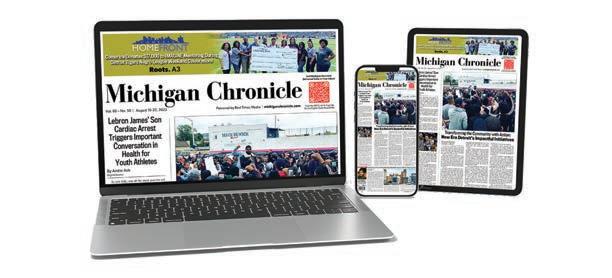


























By Ebony JJ Curry SENIOR REPORTER
BasBlue operates as a community hub designed to support women and gender-diverse people through programming, mentorship, and shared space on Woodward Avenue. The house has become a place where Detroiters gather for resources, connection, and a sense of belonging. That foundation guides BasBlue’s newest effort to address the pressure many families are carrying across the city.
Detroit households are navigating higher grocery prices, reduced SNAP support, and weekly budgets that no longer cover the rising cost of basic food items. Those shifts have pushed more families toward food insecurity and forced parents, elders, and working residents to make difficult choices about how to meet daily needs.
BasBlue is moving to fill part of that gap with its new Community Supper, a free weekly dinner open to anyone who needs a warm meal.

The Community Supper takes place every Monday from 5 to 7 p.m., offering neighbors a dependable place to sit down for dinner at no cost. The initiative operates with support from Plum Market and has already shared more than 100 meals as families learn about the program.
Detroit chefs are preparing the meals each week, bringing a range of flavors, traditions, and culinary styles that reflect the city’s food culture. Chef Rohani of Folk Detroit, Chef Mamba of Baobab Fare, and Chefs Nic and Chi of Fried Chicken and Caviar are among the culinary partners crafting the rotating menu. Their dishes are served hot, plated with care, and offered to guests without paperwork or qualifications.
BasBlue describes the supper series as part of its mission to create a network of care for Detroiters. CEO Ellen Gilchrist noted the importance of responding to the shifting food landscape and the strain caused by the change in federal benefits.
“BasBlue is about building and creating community. We knew the disruption of SNAP benefits would cause hunger and hardship amongst our neighbors,” she said. “That is why we opened our doors and brought together culinary partners from across Detroit—to make sure anyone who needs a warm meal has a place to go.”
The suppers provide structure for families who may need a steady point in the week as they juggle work schedules, childcare, and limited food options. Parents can bring children for a full meal. Elders can
See BASBLUE Page B-2

By Jeremy Allen EXECUTIVE EDITOR
A fifth grader from Detroit is about to see her dream come to life in a way she never imagined. Lyric Weathers, a student at Schulze Academy for Technology & Arts, won the grand prize in The Skillman Foundation’s 34th Float Design Contest, and her design, titled “Cultures are Around the World,” will be featured as a stunning new float in the 99th America’s Thanksgiving Parade® presented by Gardner White on Nov. 27. Lyric’s float, created from her drawing, will make its debut in front of thousands of parade-goers and millions of viewers across the nation.
The contest, which invited students from grades 4-8 in Detroit public and charter schools, asked young artists to inter-
pret the theme “My Dream for the World.”
Lyric’s design was chosen from hundreds of submissions, selected for its vibrant portrayal of cultural unity and global community. She is one of many Detroit students whose creativity was celebrated in a special unveiling event at the Parade Company, where the float was revealed to an audience of students, educators, and family members.
Speaking at the unveiling, Sarida Scott, vice president of programs at The Skillman Foundation, emphasized the importance of fostering creativity in youth, noting that “What makes this tradition special is the way it highlights the voices and visions of our young people. Their ideas and artistry remind us that the future isn’t something distant, it’s being shaped right now by their creativity and determination.” The
collaboration between The Skillman Foundation and the Parade Company aims to give young people a platform to showcase their ideas, bringing their dreams to life in a spectacular way.
Tony Michaels, the President and CEO of the Parade Company, shared the excitement of seeing Lyric’s design come to fruition. “There is nothing more amazing than seeing the reactions of everyone in attendance when we took the wraps off this beautiful float for the first time,” he said. “This is an event that every year inspires and reminds all of us of the power of creativity and how it makes the world a better place.”
For Lyric, this achievement is a culmination of hard work and imagination.

By Sam Robinson SENIOR REPORTER
One of the leaders of the group bringing a women’s basketball team back to Detroit says the “Shock” is just one of the names being considered for the new team coming in 2029.
“The name has not yet been determined, we are exploring multiple options, including the Detroit Shock, as hopefully some or all of you know was the name of the team that was here before,” Hadad told council members Tuesday, Nov. 18. “We’re open to suggestions if you have any but we’re excited to continue to work on that.” Detroit basketball fans watched the Shock win three WNBA championships before the team moved to Tulsa in 2008 after the death of Pistons owner Bill Davidson. After Davidson’s wife moved the team to Tulsa, where they used the Shock name, the franchise became the Dallas Wings in 2016.
“We are going through a process to consider multiple options for a team name, the Shock is one of those options,” Hadad told reporters after appearing before the council on Tuesday. “We’re excited to go through that process, we’ve gotten some great suggestions and some great input. We’re excited to make that determination over the next couple of years.”
Hadad didn’t directly answer when asked whether an individual currently owns the rights to the Detroit Shock name.
“I will just say that that’s one of the options that we’re looking at, but there’s a multitude of options and we’re not far enough along in the naming process,” Hadad said.
The Detroit City Council, on Tuesday, unan-
imously approved a brownfield tax abatement for cleanup costs related to the proposal. Several residents representing various organizations spoke in favor of a 75,000 square-foot practice facility and youth sports complex during public comment.
The Brownfield Tax Increment Financing package that requires state approval would reimburse up to $34.5 million for site remediation and preparation costs for the WNBA practice facility.
Tax increment financing is a tool that allows the Detroit Brownfield Redevelopment Authority to reimburse a developer by capturing the taxes on the incremental increase of the taxable value of a property as a result of the improvements made to the property. The tax capture is then reimbursed to the developer.
Detroiters for Tax Justice, an organization led by activist Russ Bellant, opposes tax abatements that use public dollars to bring large developments to the city. The group argues the financing proposal splits the project into separate ownership and cost components in order for the developer to avoid triggering Detroit’s community benefits ordinance.
“This structuring raises concerns that the developer is sidestepping community input and accountability, despite relying heavily on public resources for private gain,” the group wrote.
The community benefits ordinance requires projects exceeding $75 million in total investments and receiving at least $1 million in public subsidies to undergo a community input process with impacted residents.


find a safe, warm place to sit with neighbors. Residents who live alone can share space with others as the week begins. The environment is relaxed and shaped by volunteers and staff who approach each meal with hospitality and care.
The initiative also strengthens a long-standing practice in Detroit: community response where structural support falls short. Neighborhood networks, faith communities, and local organizations have long carried the responsibility of making sure people have what they need. BasBlue’s Monday meals follow that tradition by offering a simple resource that carries real impact.
Each week offers something different on the plate, but the purpose remains steady. People walk in from the cold. They sit down at long tables. They’re served a meal that was made by chefs who understand the role food plays in building community. The experience is consistent, welcoming, and rooted in dignity.

BasBlue is encouraging residents to share information about the suppers with anyone who may benefit. Many families learn about available resources through neighbors, churches, schools, and parent groups.
Spreading the word helps connect households who may not know the meals are available or who are unsure where to turn during weeks when food budgets run thin.
The organization emphasizes that the doors are open to all. No membership is required. No referrals. No proof of need. The focus is on being present for Detroiters who could use a place to sit, eat, and breathe during a season when food insecurity is rising.
BasBlue plans to continue hosting the Community Supper throughout the year with ongoing support from its culinary partners and volunteers. The home at 110 East Ferry St has long been a space designed to bring people together. The Monday meal extends that work into a direct response to one of the city’s most urgent challenges.
Every week, a warm plate and an open seat wait for anyone who needs them.
Ebony can be reached at ecurry@michronicle.com.
Her concept, “Cultures are Around the World,” was transformed from a drawing into a towering, full-scale float, created by Parade Company artists who worked tirelessly to capture the spirit of her vision. The float, built with wood, wire, and paint, will be a vibrant symbol of global unity, featuring bold colors, intricate patterns, and a sense of movement meant to represent the diverse cultures that make up the world.
As the grand prize winner, Lyric will ride aboard her float in the upcoming parade, a moment that will undoubtedly be a highlight in her young life. She will be joined by her family and educators, all of whom have supported her throughout the creative process. But she is not alone in her recognition. Five other Detroit students were also honored for their outstanding contributions to the contest, earning Honorable Mention awards for their designs. These students’ work will be featured on the skirt of Lyric’s float, paying tribute to their artistic talents and adding even more meaning to the final piece.
The Honorable Mention winners are Austin Callahan from University Prep Art & Design Elementary School, Axel Coyte from Charles H. Wright Academy, Robyn McKee from University Prep Art & Design Elementary, Malia Vang from Fisher Magnet Upper Academy, and Ava Wyatt from Spain Elementary-Middle School. Their de-
signs, like Lyric’s, embody the same spirit of creativity and community that the contest celebrates.
This year’s float design contest was part of an ongoing effort by The Skillman Foundation and the Parade Company to engage Detroit’s youth in artistic expression, while also providing them with an opportunity to contribute to a beloved city tradition. The contest is a reminder that young people are not just the leaders of tomorrow—they are shaping the world around them right now through their creativity, vision, and passion.
The 99th America’s Thanksgiving Parade will take place on Woodward Avenue in downtown Detroit, drawing hundreds of thousands of spectators to watch the colorful spectacle unfold. This year’s parade promises to be a showstopper, with Lyric’s float adding to a lineup that includes larger-than-life balloons, marching bands, celebrity appearances, and much more. The parade, voted the #1 holiday parade by USA TODAY, will be broadcast live on WDIV Local 4, with coverage extending to millions of viewers in 185 major U.S. cities.
For Lyric and the other students whose designs were showcased, the event is a powerful reminder that their voices are heard, their ideas matter, and their creativity can inspire an entire community. Whether they’re riding the float, cheering from the sidelines, or watching the broadcast at home, the students involved in this year’s contest will take pride in knowing they’ve made a lasting contribution to one of Detroit’s most

cherished traditions.
As Tony Michaels put it, “We try and live every day at the Parade Company with the belief that creativity has the power to make the world a better place.” For Lyric, her creativity will shine brightly on November 27, a moment that will no doubt leave an indelible mark on her and on Detroit’s holiday celebrations for years to come.
Haddad told reporters the youth academy is separate from the practice facility and will come later.
The proposed facility is in the East Riverfront District at the contaminated former Uniroyal site located at 6000 East Jefferson Ave., west of the MacArthur Bridge, and east of Meldrum Street and Mt. Elliott Park.
The Detroit Shock name is currently owned by a man named Ryan Reed, the president of the semi-pro Women’s Basketball League, which has struggled to gain traction since announcing its launch in 2023.
The league is finally playing its first games this fall, but it’s not clear how many teams make up the league. Reed told the Detroit Free Press earlier this year that he has been in communication with the WNBA about the possibility of relinquishing the name.
He said that the two have had “cordial conversations,” the paper reports. Sam can be reached at srobinson@ michronicle.com.
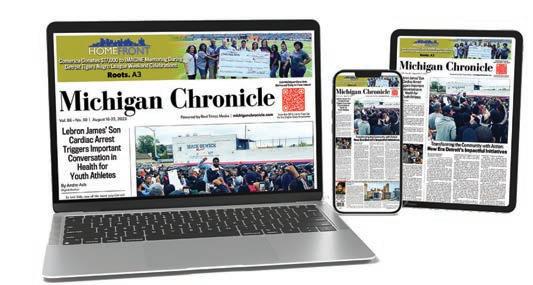


Whether you read us in print or digital, we are grateful to be your source of community news.



By Ebony JJ Curry SENIOR REPORTER
Detroit’s older residents are carrying pressures that too often stay invisible. Groceries cost more. Benefits land late. Assistance programs shift with little warning. Seniors living on fixed incomes feel those disruptions immediately. They make trade-offs between food, medicine, and utilities at a stage in life when stability should come without question.
This is the landscape Focus: HOPE is stepping into as the organization calls on volunteers for its annual Senior Holiday Delivery.
On Saturday, Dec. 20, at 8 a.m., the nonprofit will mobilize community members to deliver food boxes to 1,500 homebound seniors across Southeast Michigan — many of whom no longer have the physical or financial capacity to access consistent nutrition on their own.
Thousands of older adults in Michigan rely on monthly food assistance programs to maintain basic dietary stability. Delays and funding disruptions have made that stability unpredictable. When a benefit that typically arrives at the beginning of the month shows up weeks later, seniors feel the impact immediately. Empty pantries, postponed meals, and skipped medications follow. The safety nets that once caught older Detroiters are showing new gaps, and too many are falling through.
“The work we do wouldn’t be possible without our dedicated volunteers,” said Rachel Sherman, Manager of Volunteer & Community Outreach at Focus: HOPE. “With so many older adults facing challenges due to rising costs and program delays, it’s truly a beautiful thing to see the community come together and give back. Every delivery represents not only food, but care, dignity, and connection.”
That connection is the piece that often matters most. A box of groceries is essential. A knock on the door from a neighbor who sees you, remembers you, and shows up for you can feel lifesaving. Many seniors in the program live alone. Some have adult children who moved away for work. Others have outlived the support systems they once relied on. Loneliness compounds hardship.
A volunteer delivering a holiday box may be the only person they speak to that day.
Focus: HOPE’s Senior Holiday Delivery has grown into a tradition for that reason. It serves both the body and the spirit. Volunteers meet people where they are, in homes that hold years of Detroit history. They step into neighborhoods where seniors kept communities steady long before resources flowed elsewhere. Showing up for them is a way of acknowledging those contributions and refusing to let aging become a silent struggle.
“Our volunteers not only provide food and nourishment to a population that might not otherwise have access to it, but they also serve as a friendly face when making deliveries at their homes,” Sherman said.
The program also highlights a broader truth: Detroit’s elders have spent lifetimes holding this city together. They raised families here. They sustained neighborhoods through economic downturns. They marched, organized, voted, and built institutions that younger generations still depend on. Supporting them now is an act of reciprocity. It is a way of honoring the people who once made sure others had what they needed.
Volunteers who sign up will work alongside Focus: HOPE staff, gather their routes, load their vehicles, and carry holiday-themed boxes directly to seniors’ doors. The time commitment is small. The impact is real. One morning of service can shift someone’s entire week.
At a moment when rising costs and delayed benefits leave many seniors vulnerable, community response becomes the frontline of care. Focus: HOPE is extending the invitation. Detroiters have an opportunity to answer that call.
Those interested in volunteering must pre-register. More information is available by calling 313-494-4270 or visiting bit.ly/47NHd3X.
Ebony can be reached at ecurry@michronicle.com.
By Ebony JJ Curry SENIOR REPORTER
One of Detroit’s most recognizable landmarks is entering a new phase of life. The upper floors of the Hotel David Whitney are being converted into 79 private condominiums, creating an opportunity for homeownership inside a historic building overlooking Grand Circus Park.
The Residences at the Hotel David Whitney will include one, two, and three-bedroom units ranging from 569 to more than 2,000 square feet. Pricing begins at $277,000 for one-bedroom homes and reaches more than $1 million for larger units and upper-floor layouts.
The David Whitney Building opened in 1915 and originally housed medical offices and retail space. It sat vacant for years before Detroit-based developer The Roxbury Group purchased it in 2011 and completed a $94 million restoration. The building reopened in 2014 as a mixed-use property and has since been renovated again and rebranded as the Hotel David Whitney, part of Marriott’s Autograph Collection.
Stacy Fox, principal at The Roxbury Group, said the condo conversion is the next step in the building’s long history of reinvention. She said the project is intended to return a sense of grand hospitality and residential life to the building.
“From the beginning, our
the David
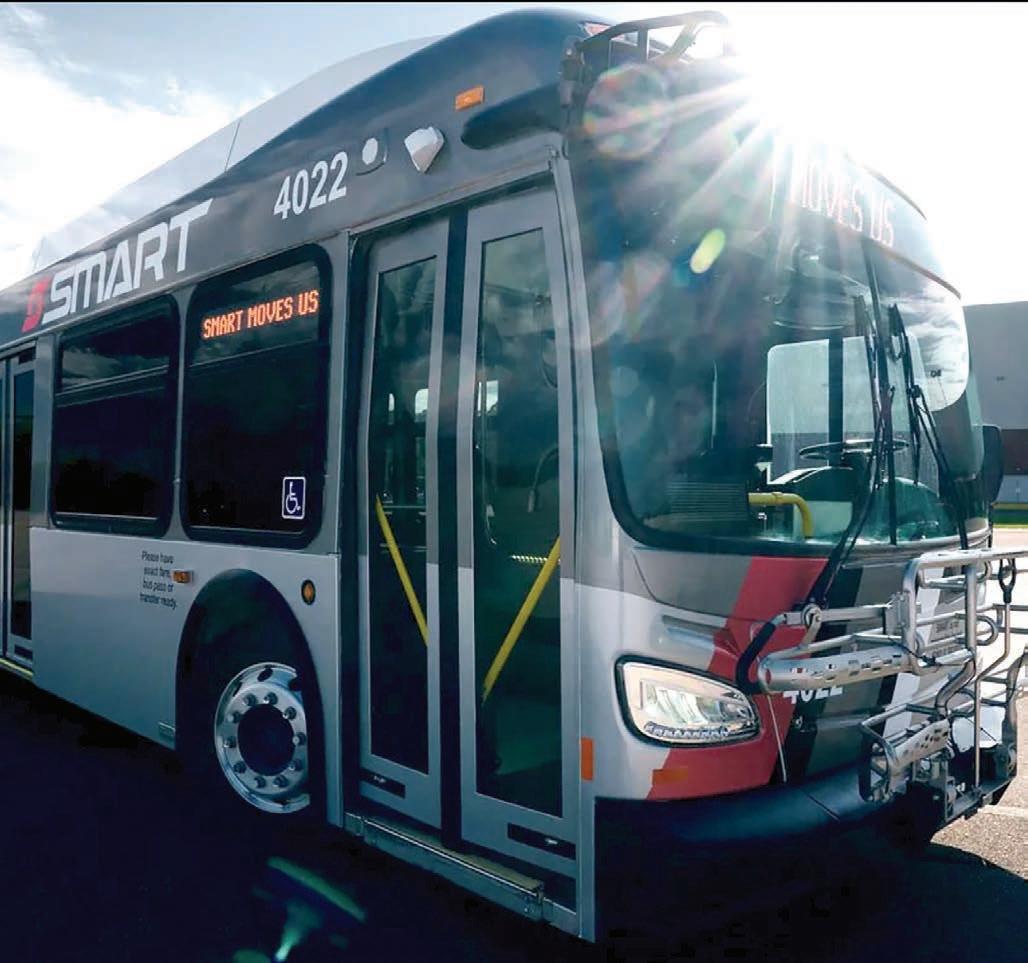
By LeJuan Burt VP OF MAINTENANCE
Every day, millions of vehicles pack the roads of Southeast Michigan, adding up to a significant environmental cost. In 2023, Michigan drivers logged 98.3 billion miles and produced 141.1 million metric tons of carbon dioxide. Passenger vehicles account for most of that impact, with 91 percent of all miles traveled and 86 percent of transportation-related emissions.
Public transit is one of the most effective tools we have to change that.
A single SMART bus can take as many as 60 cars off the road. When that bus is full, its per person emissions drop by roughly 37 to 40 percent compared with the same number of people driving alone. This is happening across our region every day. Each rider who chooses SMART over a solo trip helps lower emissions and ease congestion.
Cleaner air follows. Communities with higher transit use experience fewer tailpipe emissions, better air quality, and reduced respiratory health risks. This is especially important in urban areas where pollution tends to concentrate and where vulnerable residents feel the effects more sharply.
SMART is already moving toward a cleaner future.
Through our partnership with DTE and Proterra, electric buses are now part of Southeast Michigan’s transit network. These zero-emission vehicles reduce both air and noise pollution. Since 2022, we’ve expanded our electric fleet, with the Oakland Terminal in Troy serving as our center for charging and maintenance.
Powered by renewable energy, electric buses eliminate tailpipe pollution entirely while delivering reliable service. As the fleet grows, so does our environmental impact. We are also using data and real-time GPS to plan smarter routes, reduce fuel use, and cut idle time.
We know people face barriers to choosing transit. Limited awareness, gaps in service, and concerns about convenience can make driving feel like the default. SMART is addressing that with on-demand Flex services, onboard Wi-Fi, charging ports, and real-time arrival information that makes transit easier to use.
Infrastructure upgrades are part of the solution, too. Dedicated transit lanes and traffic signal priority, supported by the Bipartisan Infrastructure Law and Michigan’s Carbon Reduction Strategy, will help buses move faster and stay on schedule. These improvements reinforce the idea that public transit is an essential infrastructure for a sustainable future.

Michigan’s goal of carbon neutrality by 2050 means rethinking how we move people. Transit must play a central role in reaching that target.
As we move forward, the environmental value of transit will continue to go beyond reducing emissions. Communities built around reliable transit see less congestion, lower infrastructure costs, and better public health. When people have practical alternatives to driving alone, neighborhoods become more vibrant and more sustainable.
Every trip on SMART carries real environmental benefits. Choosing transit reduces emissions, improves air quality, and strengthens the infrastructure that supports healthier communities.
The environmental future of Southeast Michigan depends not just on the vehicles we drive, but on the trips, we decide not to take alone. Choosing SMART is choosing sustainability.


By Sam Robinson SENIOR REPORTER
The Detroit City Council agreed unanimously to uphold the temporary suspension of a local demolition contractor who is accused of using contaminated dirt and stiffing his subcontractors hundreds of thousands of dollars.
The two-hour special council session held inside the 13th floor’s Committee of the Whole on Tuesday afternoon, Nov. 18, was the latest in an ongoing demolition outrage involving Brian McKinney, the owner of Gayanga Co., who owes his subcontractors in excess of $1 million for unpaid work.
Council voted unanimously to uphold the suspension after listening to arguments from the city’s inspector general and attorneys for Gayanga, who was not present Tuesday.
Allegations McKinney’s company used contaminated dirt from the Northland Mall in Southfield became a larger political story when reporting revealed he briefly dated council president and Mayor-elect Mary Sheffield in 2019. Sheffield’s office said the council member sought guidance from the city’s ethics board before she and other members approved multimillion-dollar contracts for Gayanga.
Sheffield, on Tuesday, voted along with council members to keep the suspension but did not make any statements or ask any questions during the hearing.
Perkins Law Group attorneys representing McKinney defended the embattled contractor against claims made by the city’s Office of the Inspector General that he poisoned soil and vendors who say McKinney owes them more than $1 million in unpaid work.
Of the 51 tested sites where Gayanga used backfill dirt during demolitions, 47 sites exceeded state pollutant limits. Nearly 30 of the sites were deemed unsafe for direct human contact.
Attorney Adam Clemonts argued that Gayanga only utilized backfill purchased by city-approved sources. However, Inspector General Kamau Marable said the city’s evidence suggests Gayanga used several sources and vendors for backfill.
“This was never about a true investigation, and it was never about getting to the truth. It was about a way to attack Mr. McKinney and a way to steamroll the administration or the aspirations of other political appointees as they pursued higher office,” Clemonts said.
Given Gayanga has filled roughly 2,400 residential sites across the city, Marable argued it would be irresponsible not to retain the temporary suspension on the company until all sites are environmentally tested.

Francisco Javier of A&E Concrete told Michigan Chronicle he is having a hard time paying his employees, most of whom are Detroit residents, because McKinney owes him
$285,000 for work from earlier this year.
Jeffrey Andrews, a subcontractor for Valley Transport, told reporters with Michigan Chronicle and the Detroit Free Press that McKinney owes his company nearly $700,000 for recent work, saying that the demolition owner would lie about his ability to deliver payments on time.
Michael Leavitt, an attorney for several subcontractors stiffed by Gayanga, told the Michigan Chronicle that the city approved nearly $70 million in contracts with the demolition company despite it not being bonded.
Subcontractors said Tuesday McKinney had promised the company would eventually receive a bond, but that it never materialized.
The consequences of doing business as a company like Gayanga without operating with a bond are massive, Leavitt explained.
“It conceivably gives a general contractor the ability to walk away after getting paid and not paying their subcontractors, and
the subs have no recourse if that money is distributed to the general contractor… We don’t know where it went,” Leavitt said. Gayanga was not required to file payment bonds with the city, he said.
“If the subs don’t get paid, they can make a claim on a bond and prove that they did the work. The bonding company has to pay them what they’re owed,” Leavitt said.
“And the bonding company’s only resources would be to go after Gayanga.”
Carla Osborne, of Laborer’s Local 1911, is a former employee of Gayanga who worked for the demolition company from 2023 until earlier this year.
Osborne said she was retaliated against after raising concerns over working conditions. Now, she says she’s standing in food bank lines to keep food on the table for her daughter because she can’t find work.
“They told me it was because I wasn’t a right fit for the company, but I found out it was because I contacted OSHA and because they found violations with EGLE,” Osborne said. “I am qualified, I am trained from 1191 to spot all problems and to speak on it. When I speak on it (McKinney) fires me and ruins my name and blackballs me.”
You can reach Sam at srobinson@ michronicle.com.

For expecting moms and new mothers, becoming a parent is supposed to be a joyful time. But it can also be a dangerous time if warning signs go unnoticed. In Michigan, eight out of 10 maternal deaths are preventable. If you’re feeling off, trust your instincts and follow up with a health care provider right away. There are 15 warning signs for pregnant and postpartum moms that could mean your body may be trying to tell you something. Acting fast on these symptoms could save your life—and your baby’s.
KNOW THE 15 URGENT
MATERNAL WARNING SIGNS.
■ Overwhelming tiredness.
■ Persistent, severe or worsening headache.
■ Dizziness, fainting or vision changes.
■ Fever over 100.4°F.
■ Thoughts of harming yourself or your baby.
■ Trouble breathing.
■ Chest pain.
■ High blood pressure.
■ Fast heart rate, feeling like your heart rate is irregular or racing.


If you notice any of these warning signs during pregnancy or in the year after delivery, don’t dismiss them. Reach out to your health care provider immediately. If they are not available, go to the nearest emergency room and make sure they know you’re pregnant or you have recently been pregnant. If you are having a medical emergency, dial 911.
If you need help explaining to your health care provider why you are calling, seeking follow up or why you are concerned, here is some language that can guide the conversation.
■ I am very concerned and do not feel like I am being heard. What are my next steps or alternative options?


■ Severe nausea – different than ‘morning sickness’.
■ Belly pain that is severe or won’t go away.
■ Baby’s movement slowing or stopping during pregnancy.
■ Vaginal bleeding or leaking fluid during pregnancy, or heavy vaginal bleeding after pregnancy.
■ Extreme swelling of your hands, face, arms or legs.
■ Swelling, redness or pain in legs.

■ This is really different for me. I have never felt this way in my life. For my benefit and my family’s benefit I should be seen.
■ I understand that some of these symptoms may be normal for pregnancy or postpartum, but I am very concerned and need to be evaluated.
■ My doctor told me to call if I am experiencing X, Y, or Z. I am having X, Y, or Z. I would like to be seen.
■ I want to speak to someone else to make sure that I do not have a serious condition. Can you please refer me to someone who will help me? I am really worried. FEELING OFF, FOLLOW UP. Your concerns and feelings are valid, be persistent in getting the answers or care you need. Remember, eight out of 10 maternal deaths are preventable in Michigan. Listen to your body. Trust your intuition. If you’re feeling off, follow up with a health care provider. Learn more at Michigan.gov/MIH

The Detroit Public Schools Community District is seeking proposals for subcontractors under RFP 26-0151 Henry Ford High School Athletics Bid Package 1.
Architect/Engineer: Ghafari Associates, LLC 17101 Michigan Avenue Dearborn, MI 48126-2736
Construction Manager: Brinker-Christman, a Joint Venture 3633 Michigan Avenue, Suite 300 Detroit, MI 48216
There will be a non-mandatory Pre-Bid conference for this RFP that will take place virtually on December 2, 2025 at 12:00 p.m.
Please see the link to the meeting below. It is highly recommended that all bidders attend this conference. https://tinyurl.com/3rvcnxm8
Call-In: (313) 462-2305
Conference ID: 586 823 220#
There will be a non-mandatory walk-through that will take place at the below location. Please meet at the gate on the north side of the existing football field. Henry Ford High School 20000 Evergreen Rd, Detroit, MI 48219
December 3, 2025 @ 11:00 a.m.
Proposals must be submitted electronically via Building Connected by December 16, 2025, at 12:00 p.m. Late bids will not be accepted.
The Public Opening will occur virtually at 12:00 p.m. on December 16, 2025 and can be viewed at the below link: https://tinyurl.com/mahy98py
Call-In: (313) 462-2305 Conference ID: 323 579 852#
This Project is subject to Michigan State Prevailing Wage Laws (Michigan Public Act 10 of 2023) and the Contractor must pay prevailing wages and fringe benefits to all of Contractor’s, and is subcontractors’, construction mechanics working on the Project in accordance with Michigan Public Act 10 of 2023. All bids must be accompanied by a sworn and notarized statement disclosing any familial relationship that exists between the submitting company and any employee of DPSCD. DPSCD shall not accept a bid that does not include this sworn and notarized disclosure statement. A bid bond in an amount not less than five percent (5%) of the base bid is also required.

Highland Park Planning Commission will hold a
meeting on December 10, 2025 at 5:30pm. Planning

person and will be held at, THE HIGHLAND PARK FIRE STATION, TRAINING ROOM, 25 GERALD ST., HIGHLAND PARK, MI 48203. A public hearing is a portion of a meeting which is dedicated to hearing comments from the public on a specific subject.
Purpose: Request on behalf of Chain Breakers transitional Housing, LLC, to establish the Boarding and transitional housing Special Land Use as a permitted use at 234 Connecticut St. At least three (3) days prior to the meeting date, to request disability accommodations, or written comments, may be submitted in advance to: Donovan Smith, City Planner Dsmith@mcka.com
Planning Department, City Hall, 12050 Woodward Avenue, Highland Park, MI 48203
NOTICE IS HEREBY GIVEN that the Highland Park Planning Commission will hold a Public Hearing on Wednesday, April 6, 2022 at 5:30 p.m. for the purpose of obtaining public comment on a request from a group of Developers to rezone 12100 Woodward Ave. Highland Park, Ml, from CIVIC to a Transit Oriented Design (TOD) designation. The requested TOD is for the construction of a residential apartment complex. The Public Hearing will be held before the Planning Commission in person and virtual at City Hall Chambers, 2nd floor 12050 Woodward Ave. Highland Park, Ml 48203. The Zoom meeting link will be posted on the Highland Park Website. Inquiries may be addressed to Ty Hinton, Community & Economic Development Director.
2 cols x 3.5 inches



(StatePoint) While gifts are being wrapped and lights are being hung, fraudsters are devising ways to leverage the holidays to scam you out of your money. Because an urgency to buy gifts and find deals make the season a time of high risk, it is more important than ever to exercise caution and to know that scams can come in-person, by phone, by email, by text or even via social media.
Last year, Darktrace researchers detected a 692% increase in Black Friday-themed phishing attacks in late November, where fraudsters sent emails to trick people into taking certain actions, and Visa identified a 284% increase in fake and spoofed merchant websites in the four months leading up to the holiday season. A Norton Cyber Safety survey found that around a third of Americans have been targeted by a holiday shopping scam, and around half of those targeted actually fell victim.
What are some of the most prevalent seasonal scams?
Gift Card Scams. Pre-paid gift cards can be taken off the rack, drained of the funds and then repackaged, meaning you buy a gift card that has no value. Criminals attempting to scam you may also ask for payment via gift card, realizing payment is instant and your money will be irretrievable.
Package Scams. Scammers may make false claims about a returned package or other delivery issues to convince you to give them personal information. Criminals may even go as far as sending a package you didn’t order to force you to engage with them with an aim to elicit your personal information or a payment.
False Claims. Holiday fraud attempts are often made by making false claims that either a credit card was declined or that you are owed a refund of some sort, prompting you to engage and provide information.

Online Scams. Fake online shopping websites and too-good-to-be-true sales or offers are widely promoted by email and on social media. A lot of these deals will highlight a limited window of opportunity to force immediate action and create a sense of urgency.
Charity Scams. Scammers create phony charities to exploit the generosity of people during the season of giving by creating professional and legitimate-looking material online, complete with branding, photos and compelling stories. Here are some ways to help protect yourself and your wallet:
• Be Suspicious. Maintain awareness that there are a lot of fake offers and false claims during the holiday season and take the time to carefully investigate anyone you don’t know who contacts you or sends packages and asks for your personal or payment information.
• Stay Alert. Check gift cards to make sure the PINs aren’t exposed with the cover-
ings already scratched off before you purchase them. Keep track of your accounts and flag any suspicious transactions for your financial services provider or bank. If needed, freeze your account and have cards reissued. Setting up alerts with your bank enables them to flag these issues for you, too.
• Don’t Rush. Even if the deal or gift offered online or on social media seems like a great value, pause before clicking. Research the organization and stick with trusted brands and points of sale when making purchases whenever possible.
• Check Charities. Research charities before giving by utilizing a reliable charity checking site like Charity Navigator, Charity Watch or GuideStar. For more information on best practices to help prevent fraud, visit PNC’s Security and Privacy Center.
A little extra caution around the holidays can make for a season that is merry and bright.


(StatePoint) In today’s fast-paced, digital world, there are many gift-giving options for loved ones far and wide, from sending e-gift cards to their favorite shops and restaurants to creating custom video messages. However, a new survey from Duck brand, a leading maker of mailing and shipping products, finds that the festive fun of sending physical presents isn’t lost.
“We learned that most people— 98%—send at least one package containing gifts and nearly half—46%—typically mail up to three gifts throughout the season,” says Natalie Guillaume, director of product marketing, packaging tapes, at Shurtape Technologies, LLC, the company that markets Duck brand. “To make the process holly and jolly, we recommend planning ahead and purchasing high-quality supplies to ensure presents arrive on time and in one piece.”

More than 60% of survey participants say they send their packages two to four weeks in advance of when they need to arrive. Still, 43% express their greatest concern when mailing goods throughout the yuletide season is the parcel arriving on time. Knowing they can’t rely on the magic of Santa’s sleigh to make a timely delivery, Guillaume suggests getting ahead of the holiday hustle by checking delivery deadlines for the busy season. Then, leaving a little leeway to account for delays due to winter weather or other logistical challenges.
Don’t Let Tape Get Your Tinsel in a Tangle
When it comes to shipping, the wrong tape can turn anyone into a Grinch. Nearly half of people (45%) say tape not sticking well to boxes is their biggest challenge. In this case, a heavy-duty tape will do the trick. Look for one with a wide temperature range performance, so you don’t have to worry about damaged deliveries due to a frosty forecast.
Additionally, 40% of people have experienced difficulty tearing packing tape. Duck Brand EZ Start Packing Tape, made with FrustrationFree technology, provides a simple solution for smooth, easy and quiet removal from the roll. The easyto-use dispenser is uniquely designed to eliminate the annoyance of losing the tape end, which 39% of respondents say is a struggle.
With these tips, you can send parcels on their merry way for a holiday season of stress-free gift giving.
